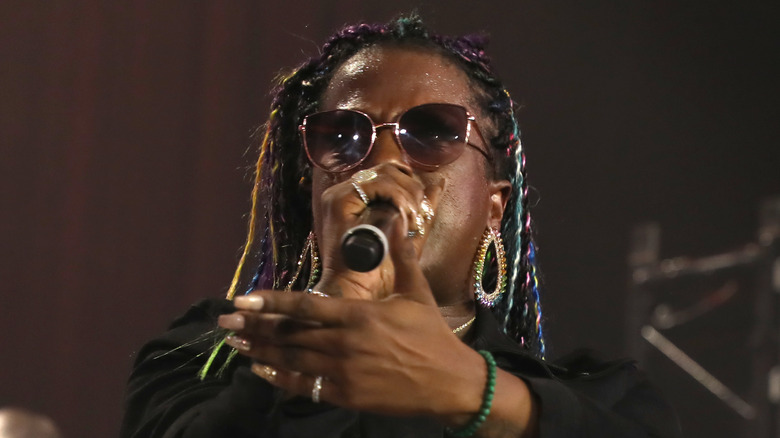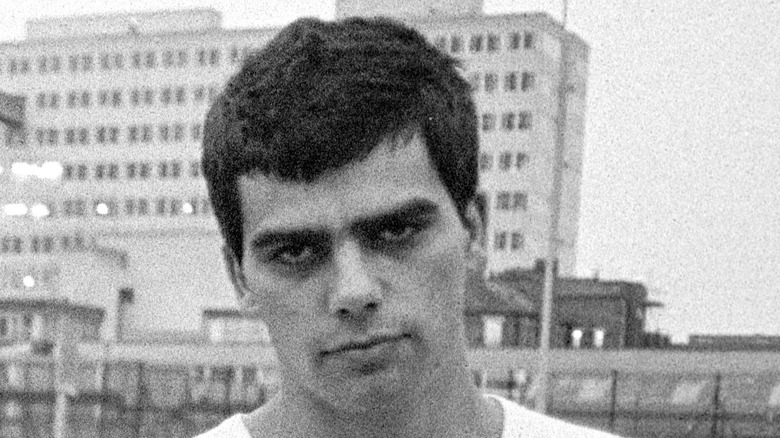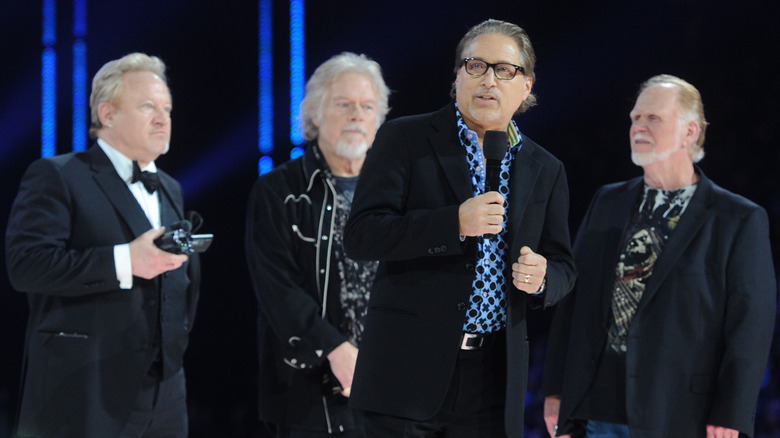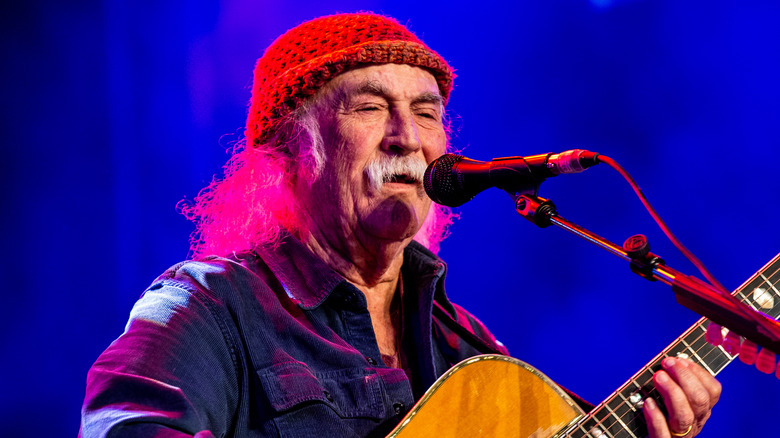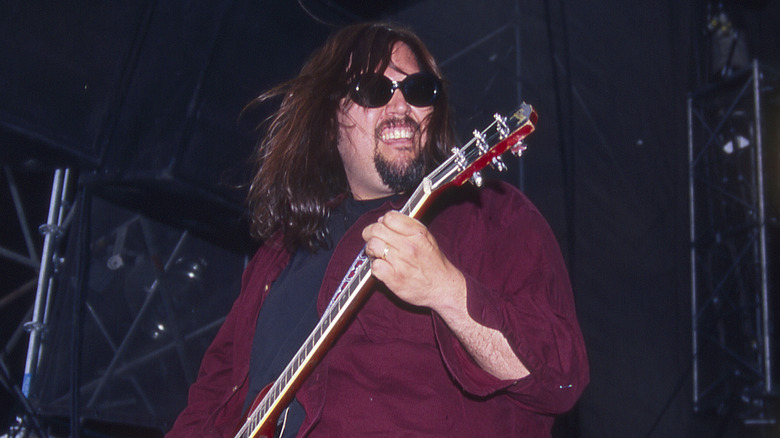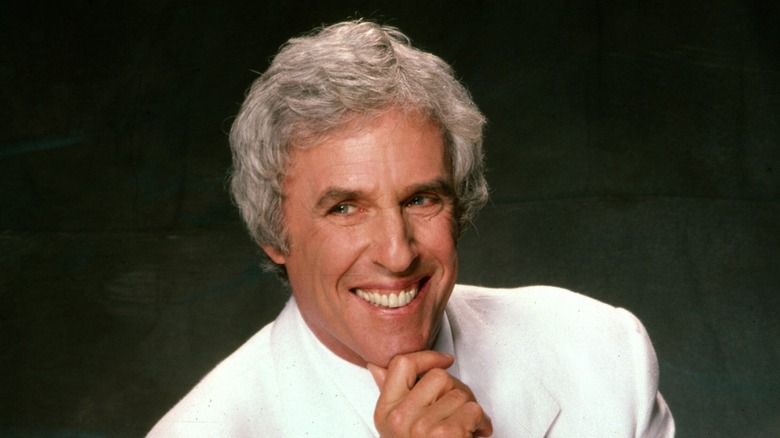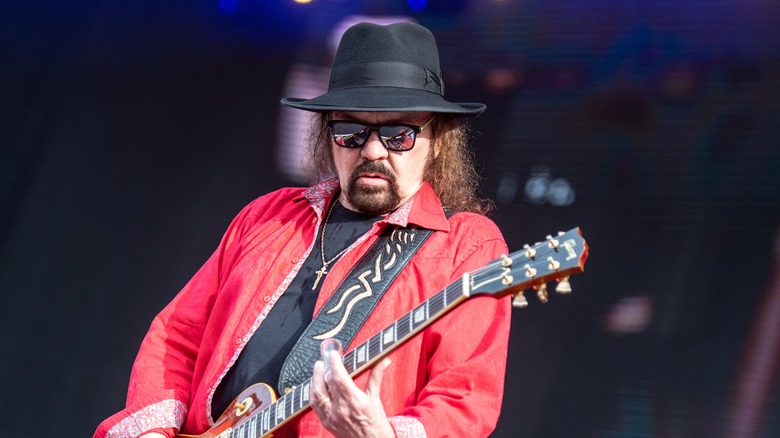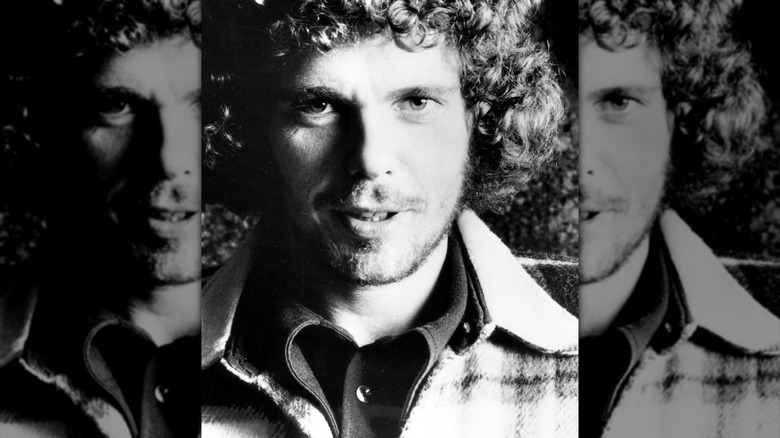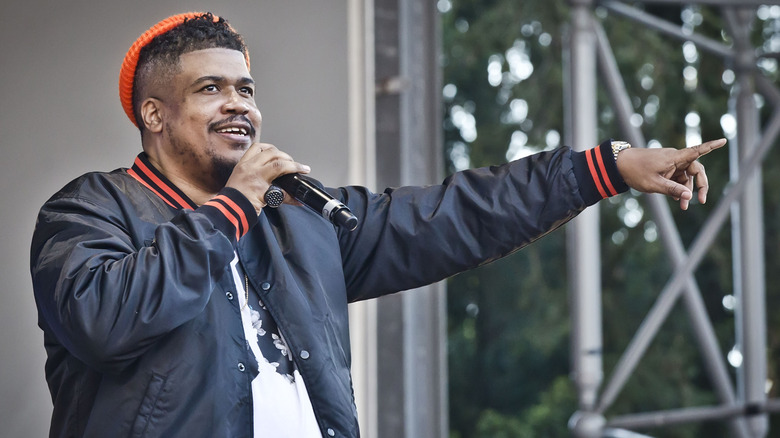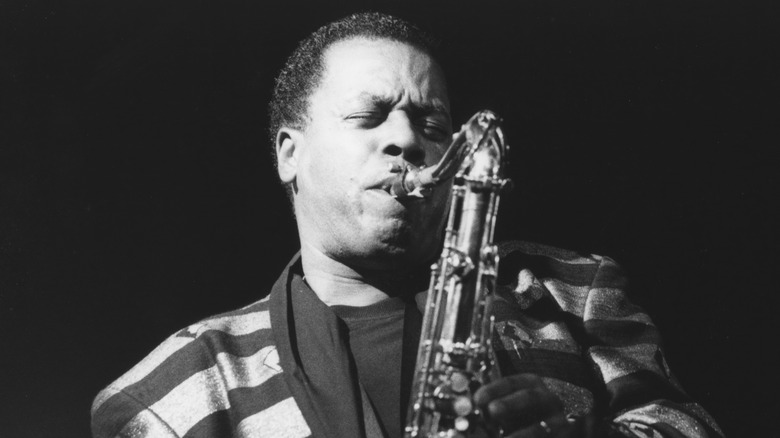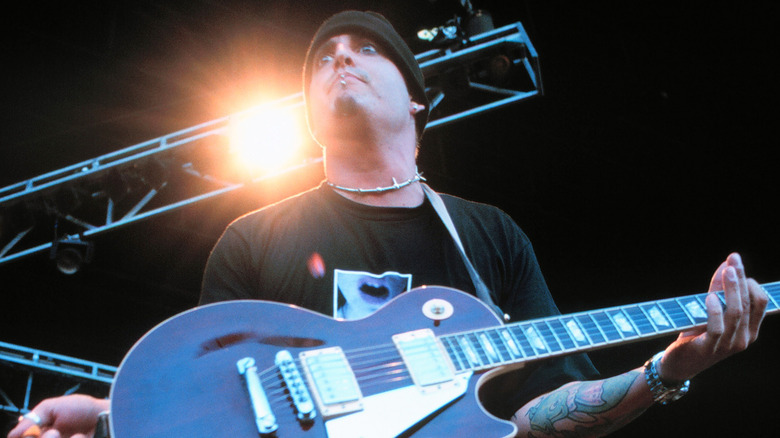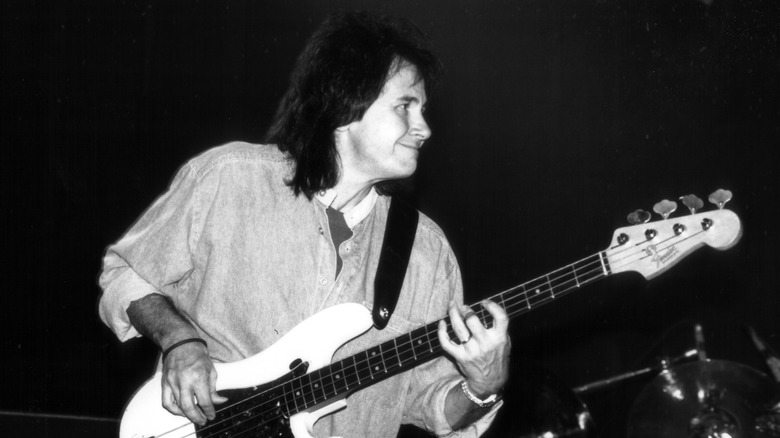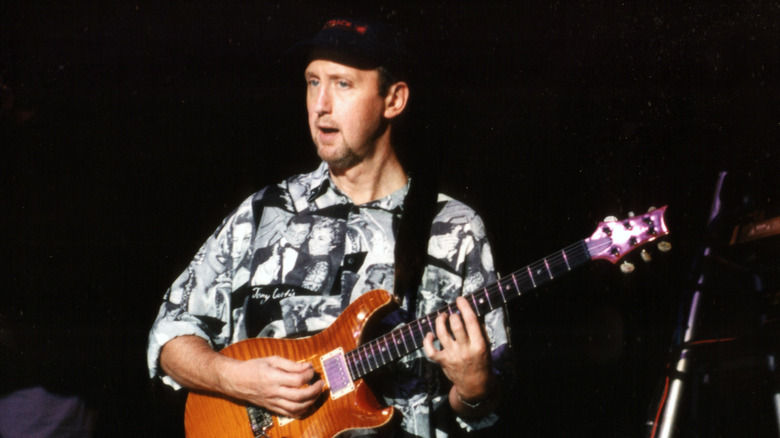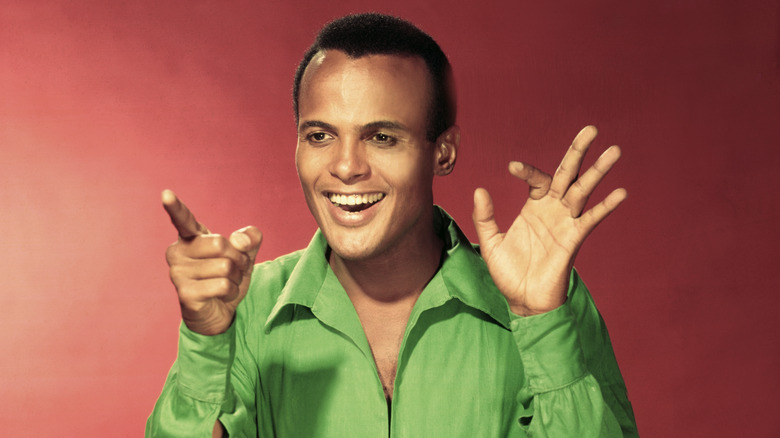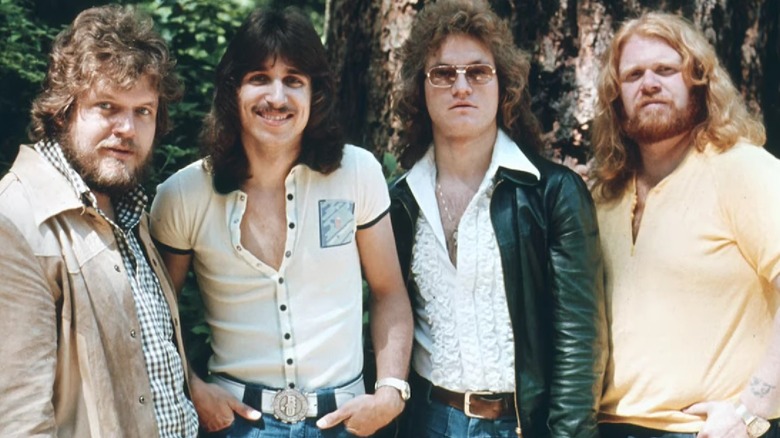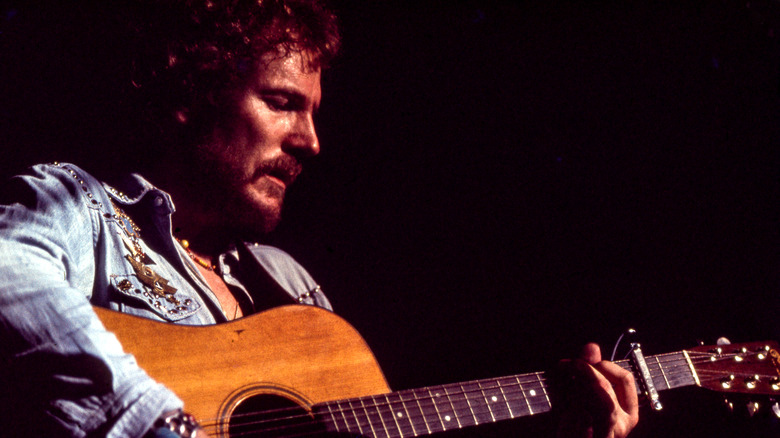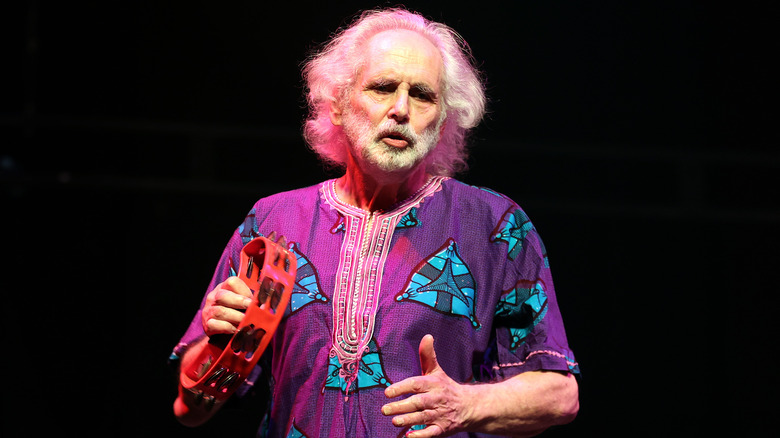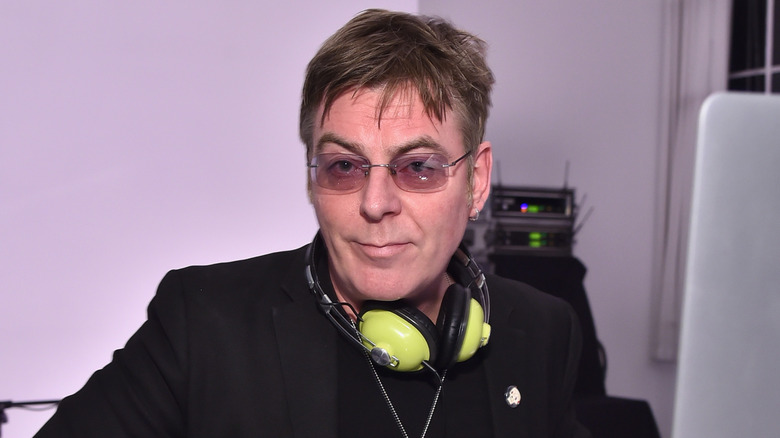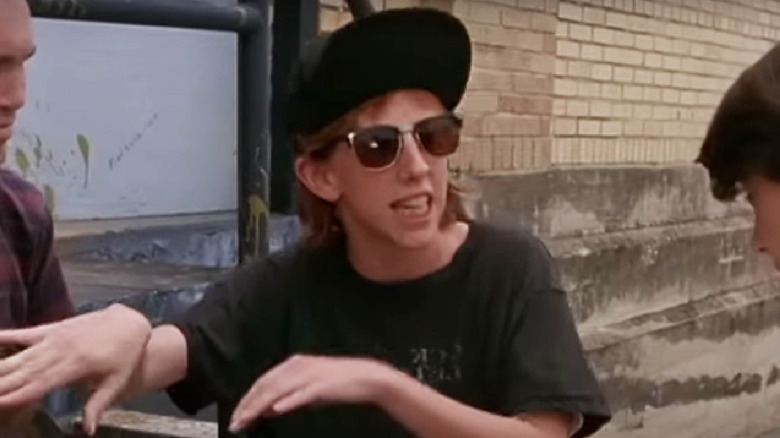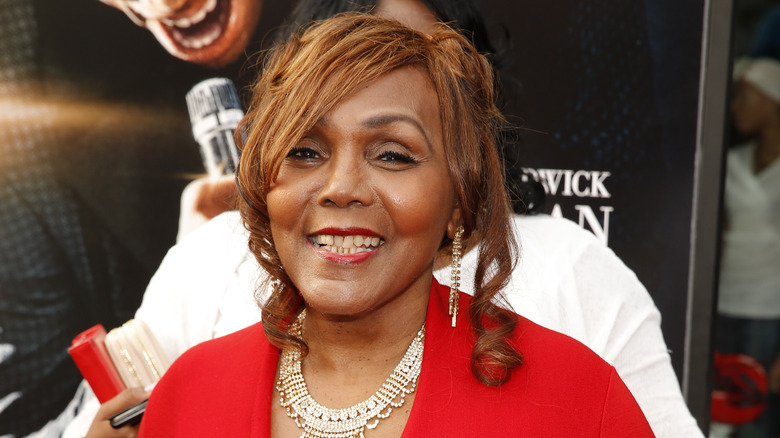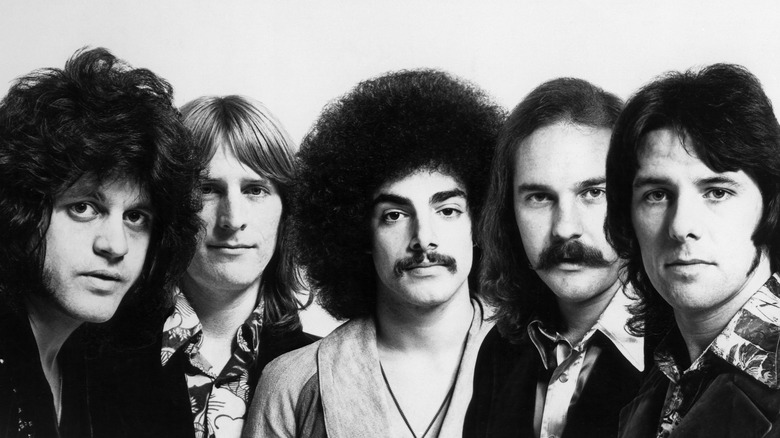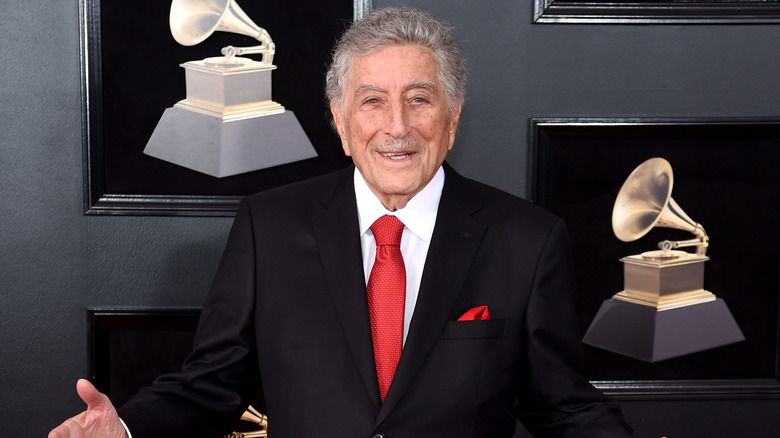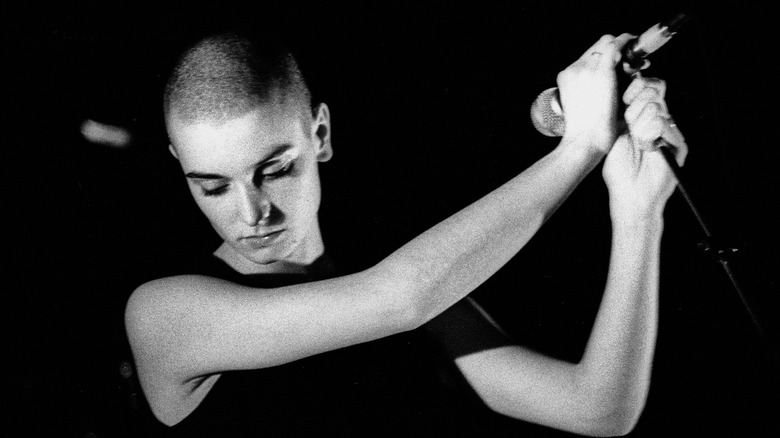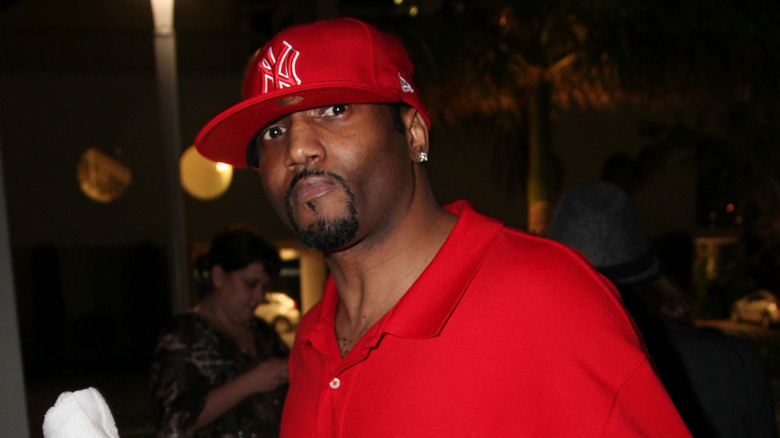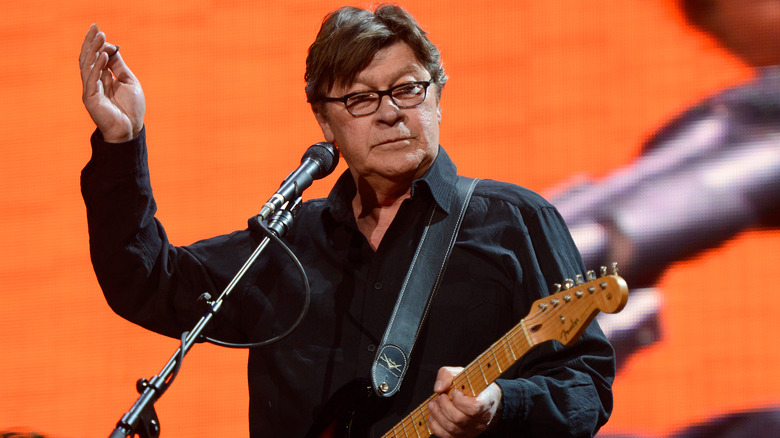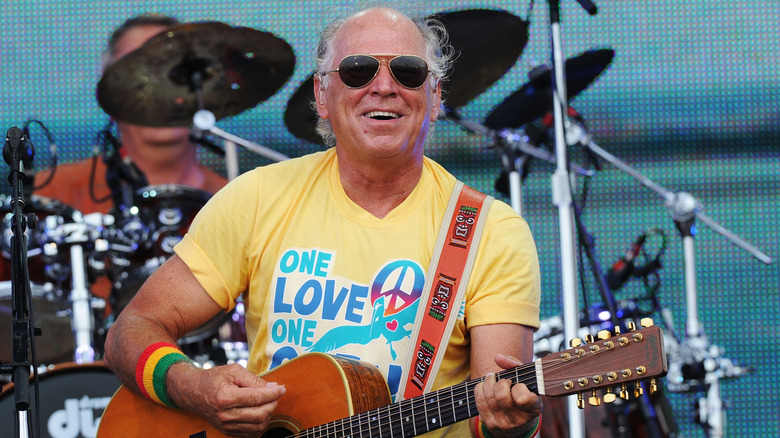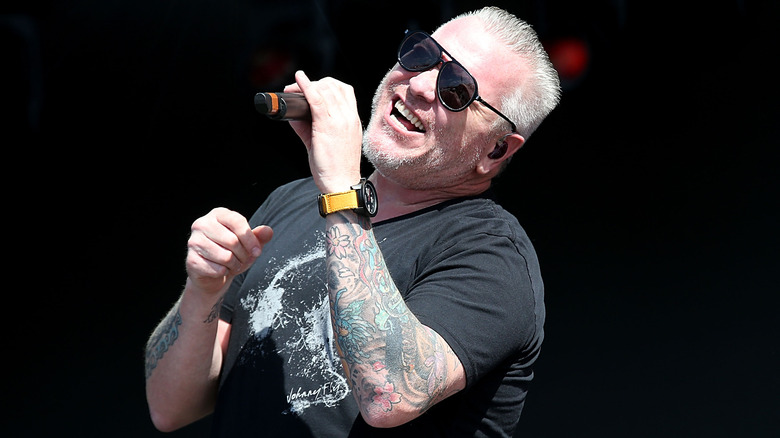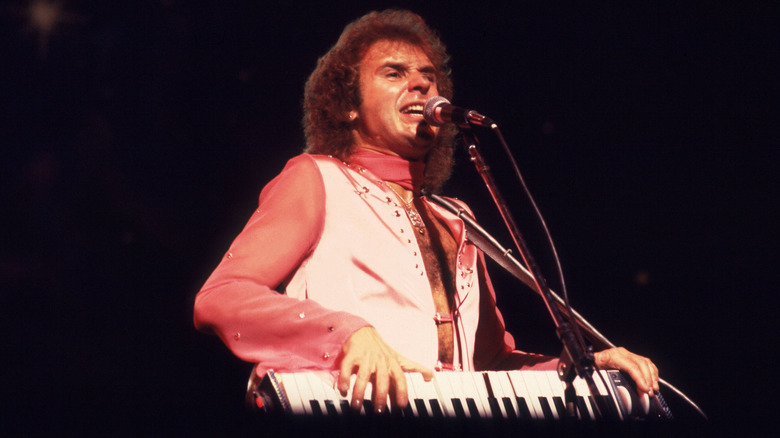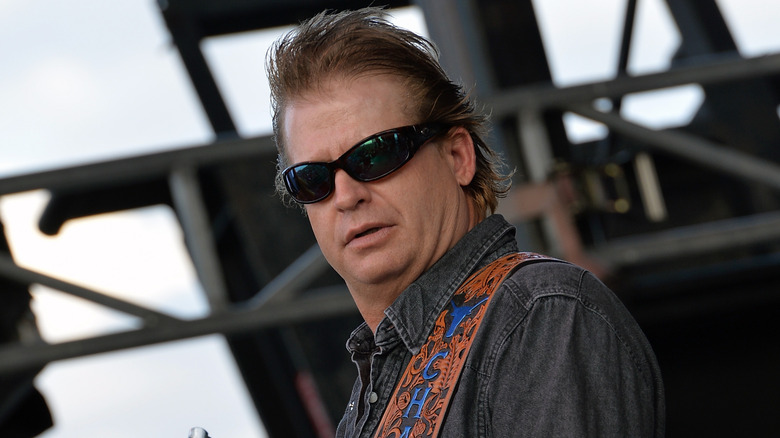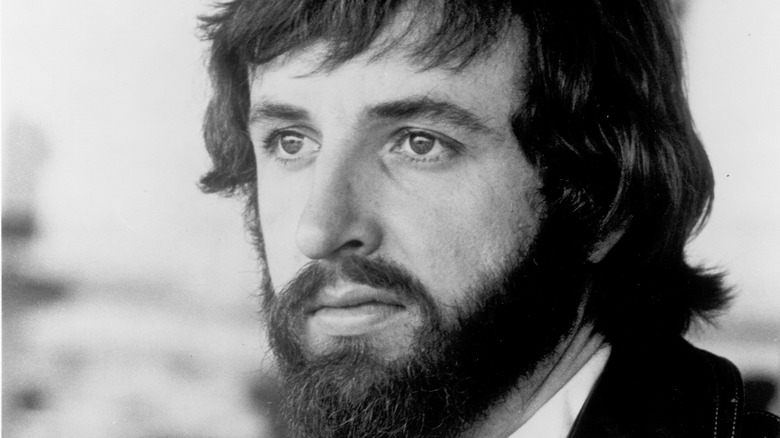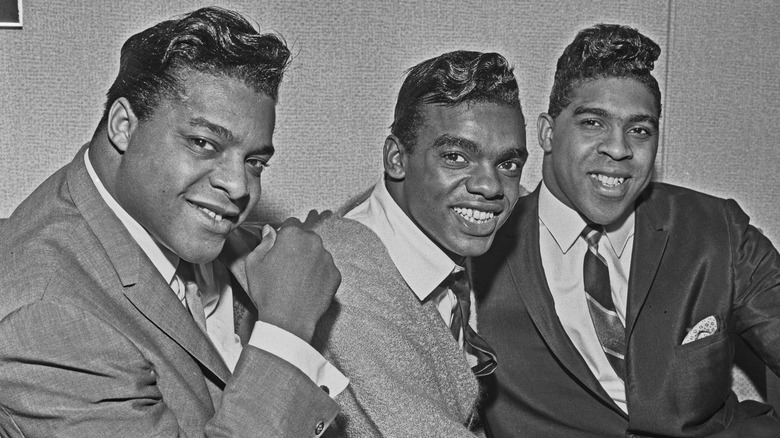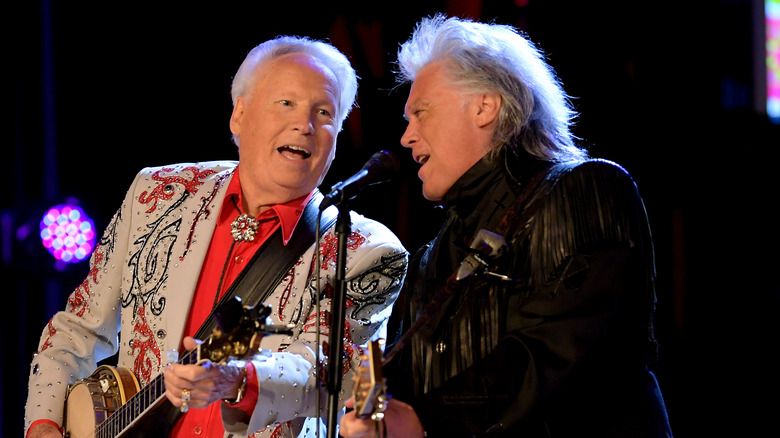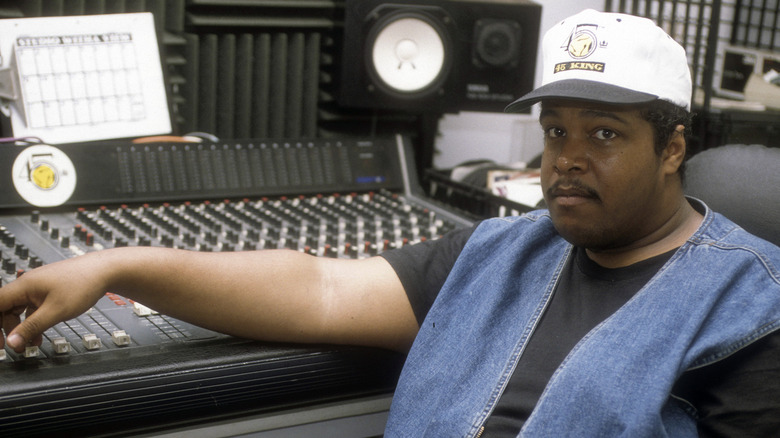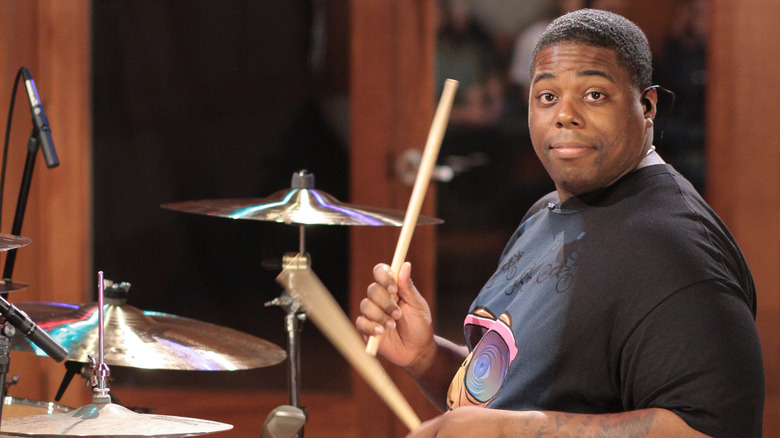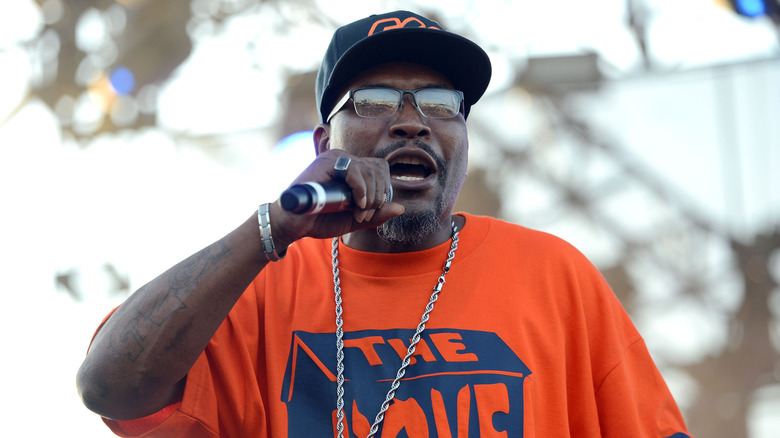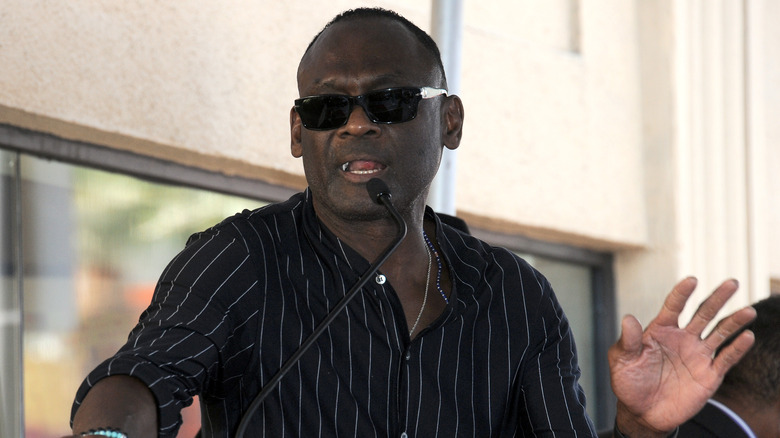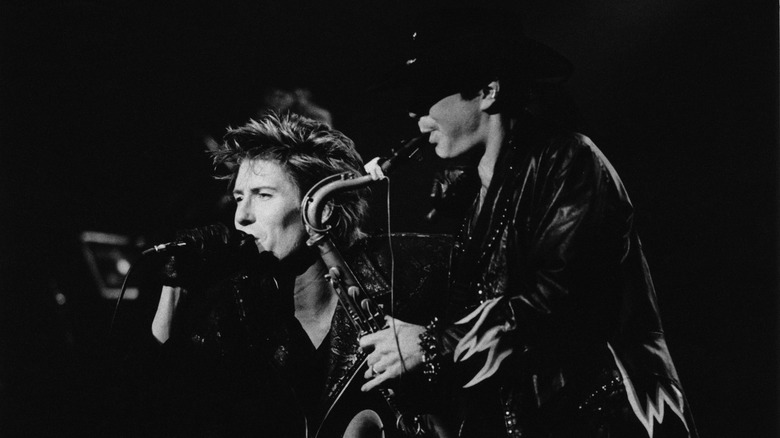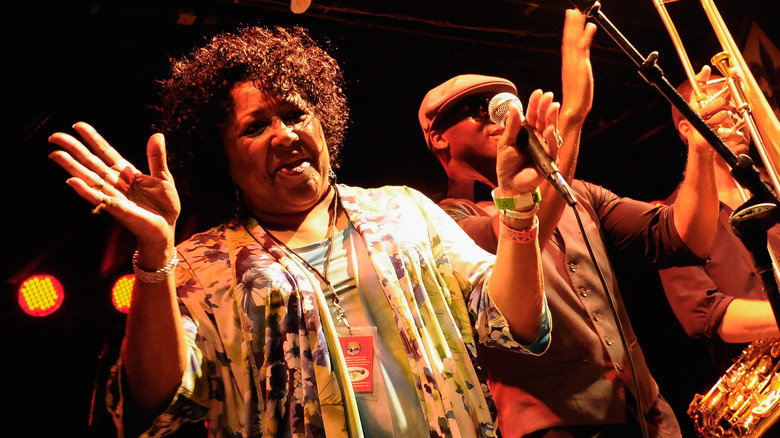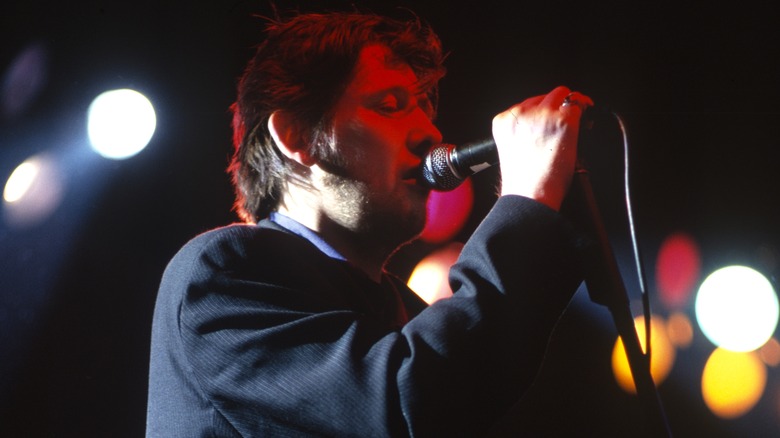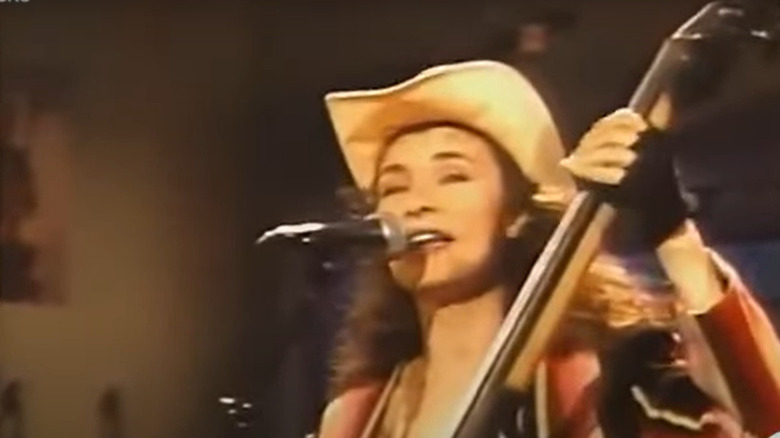Musicians Who've Passed Away In 2023
For those who eat, breathe, and sleep music, each year brings joy and sadness in equal measure. Just as fans can always count on music industry vets and newbies alike to provide a steady flow of dope new music, they can also count on the Grim Reaper to take away some of our most beloved musicians. You can't really fault the guy for doing his job, but that doesn't make it any less painful when one of our musical heroes goes off to the Great Gig in the Sky.
Among the musicians who left us in 2022 were legends like the inimitable Meat Loaf, tragic gone-too-soon figures like Foo Fighters drummer Taylor Hawkins, and multi-talented cultural icons like singer and actress Olivia Newton-John. A young 2023 has already brought with it a number of our favorite musicians who have departed from this mortal coil, but there is solace in the fact that they won't be forgotten — because unlike our physical bodies, music is immortal.
Fred White
While the legendary outfit Earth, Wind & Fire could be categorized most accurately as an R&B group, their sound has always defied labels. Early '70s hits like "Shining Star," "Sing a Song," and "September" revealed strong traces of jazz and funk running through their tunes, and when the band pivoted to disco in the late '70s, the most prominent result was a little tune titled "Boogie Wonderland," a song which has your butt shaking at this very minute simply from reading the title.
While co-lead vocalists Maurice White and Philip Bailey tended to steal the spotlight, the entire band was legendarily tight. And that all began with the rhythm section — brothers Verdine White on bass and Fred White on drums. According to The New York Times, the pair played on the vast bulk of Earth, Wind & Fire's most recognizable tunes. Unfortunately, Fred passed away at the age of 67 on January 1 — Verdine had the unfortunate task of letting the world know via Instagram of the sad news. In his memoir, "My Life with Earth, Wind & Fire," Maurice White — the half-brother of Verdine and Fred — called the drummer a "brick wall... [with] a rock-solid tempo and a rock-solid feel." Fred White may be gone, but as long as there are parties to be rocked and booties to be shaken, his contributions to music will live on.
Lola 'Gangsta Boo' Mitchell
Three 6 Mafia are bona fide hip-hop legends. Their 1995 debut LP, "Mystic Stylez," is a Southern-fried, underground lo-fi classic. Their legendary run from 1998 to 2006 saw them release two gold and two platinum albums (per RIAA), and at the tail end of it, they even scored an Oscar for contributing the stone-cold classic "It's Hard Out Here for a Pimp" to the 2005 drama "Hustle and Flow."
While they haven't released a proper album since 2008's "Last 2 Walk," their impact on Rap music and pop culture in general has been indelible — which made it particularly shocking when Lola "Gangsta Boo" Mitchell, who joined the group in 1995 and carved out a successful solo career in the late '90s and early '00s, passed away unexpectedly on New Year's Day.
According to NPR, Gangsta Boo was a sought-after vocalist, having appeared on tracks by such luminaries as OutKast, Eminem, and E-40, and at the time of her death on January 1 she had just completed a video for "Imma Mack," a single from upcoming fourth album "The BooPrint." At the time of this writing, her cause of death has yet to be established; Gangsta Boo was only 43 years old.
Alan Rankine
Scottish band The Associates isn't necessarily a household name in the United States, unless the members of your household were really into the United Kingdom post-punk scene in the '80s. If they are, then they're bound to recognize that the duo of vocalist Billy Mackenzie and guitarist/keyboardist Alan Rankine were far more influential than their relatively slight discography and cult status might suggest. Just ask the uber-talented Icelandic singer Björk, who didn't hesitate to name The Associates' 1982 sophomore effort "Sulk" as the album everyone should hear before they die, when posed the question by NME in 2018.
The Associates boasted a similarly heavy influence on a slew of post-punk and new wave bands of the '80s, and according to the BBC, said bands all came out to pay tribute to Rankine on social media when he passed away on January 3 at the age of 64. In addition to his work with The Associates, Rankine established Electric Honey Records, a student-run label at Glasgow Kelvin College, where he was a professor; in 1996, the label dropped "Tigermilk," the debut release from the critically acclaimed indie pop outfit Belle and Sebastian.
Jeff Beck
As musical pedigrees go, one could do a whole lot worse than "former member of The Yardbirds." According to Brittanica, that legendary '60s outfit has produced more insanely talented guitarists than any one band has a reasonable right to, which is to say three: Jimmy Page, who would later set the world on fire with Led Zeppelin; Eric Clapton, who would front supergroup Cream before going on to a stellar solo career; and Jeff Beck, a square peg who never found a round hole he couldn't fit into.
Beck's time in bands not named after himself may very well have been short simply because his innovations were too much for his bandmates to keep up with. Per The Guardian, he was a pioneer of jazz-rock fusion, did things with distortion and fuzz boxes that none of his peers at the time were doing (and which helped pave the way for hard rock and heavy metal). His work earned him acclaim: He was an eight-time Grammy winner and double-inductee into the Rock and Roll Hall of Fame (both as a solo artist and as a member of The Yardbirds).
Beck passed away on January 10 from bacterial meningitis, leaving a smoking, guitar-shaped crater in the world of music, and among those to pay tribute was his former bandmate Page. On Twitter, Page wrote, "The six stringed Warrior is no longer here for us to admire the spell he could weave around our mortal emotions. Jeff could channel music from the ethereal."
Lisa Marie Presley
When you are the daughter of the King of Rock 'n Roll, your life is bound to be an interesting and publicly-lived one. This was certainly true for Lisa Marie Presley, who was born into music royalty, became an heir to her father's vast estate after his 1977 death at only nine years old (per Today), and even took an unsuccessful crack at keeping her royal lineage going with a brief marriage to King of Pop Michael Jackson between 1994 and 1995 (via US Magazine).
She may have been more well-known for being constantly scrutinized by the tabloids and for her charitable endeavors, of which she had many, per The Guardian — but she inherited her father's love of music, and she was a pretty talented artist in her own right. Presley released three albums during the course of her career: 2003's "To Whom It May Concern," 2005's "Now What," and 2012's "Storm & Grace," with the former two having notched spots in the Billboard Top 10.
Unfortunately, Presley's final years were marred by tragedy; her son Benjamin Keough, from her pre-Michael Jackson marriage to musician Danny Keough, died by suicide at the age of 27 in 2020 (via US Magazine). Then, in January 2023, Presley went into cardiac arrest at her home and was rushed to the hospital, but she was unable to pull through; she died the evening of January 12 at the age of 54. Per CBS News, her final resting place will be at her father's iconic Graceland estate, next to her son.
If you or anyone you know is having suicidal thoughts, please call the National Suicide Prevention Lifeline by dialing 988 or by calling 1-800-273-TALK (8255).
Robbie Bachman
Bachman-Turner Overdrive was a Canadian band that had a pretty stellar run in the '70s. Formed by former Guess Who guitarist Randy Bachman, the outfit made a splash with its 1973 sophomore effort "Bachman-Turner Overdrive II" and its driving single "Takin' Care of Business," and an even bigger one with 1974's "Not Fragile," which scored them a No. 1 hit single with "You Ain't Seen Nothing Yet," per AllMusic. Randy left the group in 1977, but it carried on without him — with no name change, as it had another Bachman in stock, Randy's brother Robin "Robbie" Bachman on drums.
Robbie kept the band's torch burning into the early '90s, and it's safe to say that its legacy is strong. Bachman-Turner Overdrive was inducted into the Canadian Music Hall of Fame in 2014 (via CNN), and if you'd like to hear one of their classic hits, go ahead and tune into literally any classic rock radio station and wait about 15 minutes.
Unfortunately, there will be no getting the band back together. On January 12, Robbie Bachman passed away at the age of 69 from undisclosed causes. Randy Bachman took to Twitter to mourn his brother, saying, "He was an integral cog in our rock 'n roll machine and we rocked the world together," and astutely speculating that perhaps Jeff Beck, who had died just two days before, had been in need of a good drummer.
David Crosby
Many professional musicians live colorful lives, but David Crosby's was perhaps a bit more colorful than most. A folk-rock pioneer, Crosby has been inducted into the Rock & Roll Hall of Fame twice — as a member of the Byrds, and as a member of Crosby, Stills, and Nash, both iconic groups that made enormous contributions to popular music in the '60s and '70s. Crosby remained committed to performing for decades, even as his recording career wound down, and as he has openly struggled with addiction and health problems. Throughout it all, his voice — which was so often heard beautifully blending with those of his partners Graham Nash and Stephen Stills — remained strong, as did his opinions on music, politics, and life in general.
In his final interview with Rolling Stone published in February 2023, Crosby confessed to being puzzled as to how he had managed to outlive so many of his peers and also offered some gems of wisdom in response to readers' questions. Queried as to how the "Peace and Love" generation went wrong, he responded, "Well, I've asked myself the same thing. I'm an idealist ... We are trying to evolve as human beings to the point where we don't have ego, and anger, and greed, and lust running our affairs. I don't know if we're going to make it. I believe that we will." Crosby passed away on January 18 at the age 81.
Van Conner
The Screaming Trees may have had the misfortune of arriving just a tad too early to participate fully in one of the major musical movements of the late 20th century. They were formed in 1984 in Ellensburg, Washington, about a hundred miles from Seattle, by brothers Gary Lee Conner and Van Conner on guitar and bass, respectively, and vocalist Mark Lanegan, later adding drummer Mark Pickerel. The released their first album in 1986 after being signed to tiny label Velvetone Records on the strength of their very first demo. A couple label changes and two more albums did little to raise their profile, but after briefly going their separate ways to work on side projects, the band signed to Epic Records and released their breakthrough album "Uncle Anesthesia" — co-produced by Soundgarden's Chris Cornell — in 1991.
This, of course, is the year that Nirvana's "Nevermind" exploded across the pop culture landscape, and while peers such as Cornell's Soundgarden, Pearl Jam, and Alice in Chains rode the grunge wave to success and acclaim, the Screaming Trees fielded just one major hit in "Nearly Lost You." Infighting, side projects, and Lanegan's struggles with addiction conspired to keep the band from achieving the stratospheric levels of success enjoyed by many of their contemporaries, but the Trees' unique, almost-grunge sound and commitment to their craft earned them the admiration of their more successful peers. On January 17, Van Conner died at the age of 55 after a protracted illness.
Tom Verlaine
While New York band Television only recorded two albums during their '70s heyday — 1977's "Marquee Moon" and 1978's "Adventure" — the band had an outsized influence on their peers. Although the band is closely identified with legendary Big Apple club CBGB — and the bands whose careers it helped to launch, like Blondie and Talking Heads — its sound was something entirely different, sprawling art-rock delivered with a punk attitude. It was a sound that would exert a heavy influence on such future megastars as R.E.M., Red Hot Chili Peppers, and U2 — and a key piece of its musical puzzle was guitarist and singer Tom Verlaine.
Verlaine's experimental guitar work, unique vocal delivery, and clever lyrics earned the praise of critics and peers alike, but the unclassifiable nature of Television's music and Verlaine's strong anti-commercial leanings combined to ensure that the band would never amass the ginormous following that they probably should have. In a 2006 New York Times interview, when asked to sum up how a biographer would present his life, Verlaine replied, "Struggling not to have a professional career." Indeed, Television reunited for just one additional album, a self-titled 1991 effort, after leaving their indelible mark on countless bands with their '70s work — but they continued to thrill fans with sporadic live performances into the aughts and teens, with even their latter-day performances drawing rave reviews. Verlaine passed away on January 28 at the age of 73.
Burt Bacharach
Great composers of popular music have become enough of a rarity so as to be virtually nonexistent in the modern age, and in the '60s — even as the famed composers of New York's Brill Building were still cranking out hits — they were already on the decline, ready to give way to the singer-songwriters of the '70s. That storied structure, which launched the careers of such famed songwriting teams as Gerry Goffin and Carole King, gave us one composer whose reach and influence would extend into the '80s and beyond: Burt Bacharach, who teamed with lyricist Hal David (among others) to give us some of the most iconic tunes of the last six decades.
Bacharach launched his career by penning tunes for the uber-talented vocalist Dionne Warwick, such as "Don't Make Me Over" and "Do You Know the Way to San Jose." He would go on to write iconic song after iconic song: "Raindrops Keep Fallin' On My Head" by B.J. Thomas, "(They Long to Be) Close to You" by the Carpenters, "A House is Not a Home" by Luther Vandross, "Walk on By" by Isaac Hayes, and Warwick's "That's What Friends Are For," to name just a few. His storied career included six Grammy wins, an induction into the Songwriters Hall of Fame, and the Gershwin Prize for Popular Song from the Library of Congress; perhaps having simply accomplished all that he possibly could, Bacharach passed away on February 8 at the age of 94.
Steve Mackey
Although they were founded in 1978, Britpop band Pulp enjoyed next to no commercial success for well over a decade afterwards. Formed by vocalist and lyricist Jarvis Cocker as a teen, the band plowed through members and various styles throughout the '80s, finally settling on a semi-stable lineup that included bassist Steve Mackey. With Mackey aboard, the group cashed in on the Britpop explosion of the mid-'90s, having commercial success with their albums "His 'n' Hers" (1994), "Different Class" (1995), and "This is Hardcore" (1998).
After Pulp disbanded in the early aughts, Mackey dabbled in photography and continued to work as a songwriter, producer, and remixer for the likes of Florence + The Machine and Arcade Fire. Unfortunately, Mackey's intriguing post-Pulp journey ended on March 2, when he passed away from an undisclosed illness. On its official Instagram page, Pulp shared a photo of Mackey hiking in the Andes in 2012. "Steve made things happen. In his life [and] in the band," read the caption. "We'd very much like to think that he's back in those mountains now, on the next stage of his adventure." Mackey was 56 years old.
Gary Rossington
Southern-fried rockers Lynyrd Skynyrd were one of the more successful bands of the '70s, scoring four successful studio albums and a live recording before tragedy struck in 1977. That year, just days after the release of their fifth studio album "Street Survivors," the band's chartered plane went down in a wooded area outside Gillsburg, Mississippi. The crash took the lives of lead singer Ronnie Van Zant, guitarist Steve Gaines, and his sister, backup singer Cassie Gaines, forever altering the band's lineup and career trajectory.
The band continued, with Ronnie Van Zant's brother Johnny Van Zant taking over front man duties, in various configurations over the years. The death of original drummer Bob Burns in 2015 left the band with only one founding member remaining: guitarist Gary Rossington, who ironically had inspired the band's cautionary rocker "That Smell" (with its lyric "The smell of death surrounds you") after surviving a car crash while under the influence of alcohol and drugs in 1976. Rossington had been dealing with heart problems for some time — and on March 5, the last surviving original member of Lynyrd Skynyrd passed away from undisclosed causes at the age of 71.
Jim Gordon
In another universe, Jim Gordon is remembered for one thing, and one thing only — being one of the most rock-solid, talented drummers to ever sit behind a kit. A student of the great Hal Blaine and a former member of the legendary group of studio musicians known as the Wrecking Crew, Gordon's drums have featured on some of the most iconic recordings of rock's early era. A partial list of songs on which he played includes "Layla" by Derek and the Dominoes (which he co-wrote), "You're So Vain" by Carly Simon, "Rikki Don't Lose That Number" by Steely Dan, and "Apache" by the Incredible Bongo Band; he's worked with the likes of John Lennon, George Harrison, Tom Waits, and Harry Nilsson. Unfortunately, his incredible work ethic and blinding talent masked a terrible secret — he had schizophrenia, and he had been experiencing auditory hallucinations, hearing voices in his head, since his youth.
Speaking with Rolling Stone in 1985, Gordon said, "The voices were chasing me around. Making me drive to different places. Starving me. I was only allowed one bite of food a meal. And, if I disobeyed, the voices would fill me with a rage." Gordon learned to obey those voices without question, and on June 3, 1983, they directed him to do the unthinkable — he attacked and killed his 71-year old mother at her apartment in Hollywood. He was sentenced to 16 years to life in prison, and while he had been eligible for parole several times, he always declined to attend his hearings. Gordon passed away from natural causes at 77 on March 13.
Dave Trugoy the Dove Jolicoeur
Few Golden Age hip-hop outfits have put together careers with the kind of longevity that De La Soul have. The trio — composed of Kelvin "Posdnuos" Mercer, Dave "Trugoy the Dove" Jolicoeur, and Vincent Lamont "Pasemaster Mase" Mason Jr. — arrived on the scene in 1989, immediately positioning themselves as an alternative to the hard-edged, braggadocious rappers of the day with their humble, hippie-esque fashion sense and a musical aesthetic they dubbed "D.A.I.S.Y." ("Da Inner Sound, Y'All"). Their classic debut album "3 Feet High and Rising" broke new ground in sampling, and the band's adventurous production and deft lyricism remained consistent throughout four separate decades with releases like "Buhloone Mindstate" (1993), "The Grind Date" (2004), and "And the Anonymous Nobody" (2016).
Unfortunately, that legendary run came to an end with the death of Jolicoeur, who had in the past discussed medical issues related to congestive heart failure, on February 12. His passing came just weeks before De La Soul's catalog, which for years had been absent from streaming services due to legalities involving sample clearances, finally made its digital debut on March 3. In a statement on Instagram, Mercer penned a heartfelt tribute to his friend, which read in part: "Your passing is a great loss not only to us, but also to the entire hip-hop community. You were a true artist who used music to inspire and uplift others, and you will be deeply missed by all who knew you."
Wayne Shorter
Saxophonist and composer Wayne Shorter may not be a household name — unless your household is one that enjoys modern jazz music. In that case, you likely acknowledge him as one of the greats of the genre. He was an expressive instrumentalist, equally yet distinctly adept on tenor and soprano sax with a keen talent for songcraft, who has shared the stage and studio with some of the true jazz titans. As noted by his biography page on the website of the legendary jazz label Blue Note, Shorter as a young man practiced the sax with John Coltrane. Early in his career, he put in time with Art Blakely's Jazz Messengers, becoming that outfit's music director before he was lured away by none other than Miles Davis.
With Davis' quintet, Shorter composed some of the legendary trumpeters' signature tunes, including "Footprints," "Nefertiti," and "Prince of Darkness," in the process becoming a pioneer of jazz fusion. In the '70s, Shorter and pianist Joe Zawinul formed the fusion outfit Weather Report, whose 1977 LP "Heavy Weather" went Platinum in the era of disco. Late in his career, Shorter toured with the likes of the Rolling Stones and Herbie Hancock while also cutting records with his own quartet. His final studio album on Blue Note, "Emanon," was released in 2018. Shorter passed away in Los Angeles on March 2, at the age of 89.
Bobby Caldwell
In 2015, legendary R&B and jazz vocalist Bobby Caldwell sat down with Red Bull Music Academy to recall his humble career beginnings in the late '70s, a time during which the smooth-voiced Miami-based singer struggled mightily to land a record deal. He finally struck gold with hometown label TK Records, home to disco outfit KC and the Sunshine band, which gave him all the creative freedom a young artist could ask for in producing his classic, self-titled debut album and its monster hit single, "What You Won't Do For Love." With the record in the can, though, Caldwell says there was only one problem: "We did a shoot for the album cover, and my hair was down to my shoulders and [it] was done on the beach," he said. "And for them, I guess they got skittish with going to Black radio with somebody who was whiter than a loaf of bread."
The label's solution was to shoot a new album cover with Caldwell in silhouette — and once R&B fans got a taste of his astonishingly soulful voice, they cared not one bit what color he was. Caldwell would go on to release over a dozen studio albums, with his awesomely-titled final release, "Cool Uncle" — featuring guest appearances from the likes of Deniece Williams, Jessie Ware, and Cee-Lo Green — coming in 2015. On March 14, after a protracted illness, Caldwell's wife shared that he passed away at his home in New Jersey; he was 71.
Wayne Swinney
Memphis outfit Saliva dropped its self-titled, self-released debut in 1997, but it took mainstream rock radio a few years to catch up to their brand of rap-infused hard rock. The band — comprised of vocalist Josey Scott, guitarists Wayne Swinny and Chris Dabaldo, bassist Dave Novotny, and drummer Paul Crosby — struck gold, or rather platinum, with their 2001 sophomore effort "Every Six Seconds." That release spawned the hit singles "Your Disease" and "Click Click Boom," earned the band a Grammy nomination, and thrust them into the national spotlight. Their profile was further raised with Scott's collaboration with Nickelback singer Chad Kroeger on the single "Hero" from 2002's "Spider-Man" soundtrack, and a steady stream of hit albums followed.
The band went through a couple of lineup shuffles in its later years, with founding members Dabaldo and Scott leaving the band for other projects in 2005 and 2011, respectively. Their revised lineup continued to record and tour, however — and it was only three dates into their latest outing, in support of three new singles released in 2022, that tragedy struck. On March 22, the band reported via its Facebook that Swinny had died from a spontaneous brain hemorrhage; he was only 59. In a subsequent post, the band announced its intention to release the album they had just completed, "so everyone can hear the new songs that Wayne put his heart and soul into," and to continue with their tour.
Tom Leadon
The late Tom Petty and his band, the Heartbreakers, are rock and roll icons — but casual fans may not know that the outfit wasn't Petty's first band. In 1970, Petty, guitarist Tom Leadon (brother of the Eagles' Bernie Leadon), and drummer Randall Marsh — along with future Heartbreakers Mike Campbell on guitar and Benmont Tench on keyboards — formed Mudcrutch, a countrified rock band that labored on the bar scene in their native Florida for several years. After ditching the Everglades for Los Angeles in 1974, the band signed a contract with Shelter Records — and promptly broke up, leaving Petty free to go on to staggering success.
Astonishingly, decades later in 2007, the entire band reunited to record a self-titled album, following that up with a sophomore effort — succinctly titled "2" — in 2016. It was an interesting and rare second chance for a band that might have enjoyed superstardom if they had soldiered on throughout the '70s, but Petty's unexpected passing in 2017 cut their resurgence short. Unfortunately, on March 22, Leadon — who had remained friends with his Mudcrutch mates throughout their stellar careers as Heartbreakers — died at the age of 70 at his home in Gainesville. In the wake of his passing, Campbell took to Twitter to eloquently eulogize his "guitar soul brother," writing, "We spent countless hours playing acoustic guitars and teaching each other things. A kinder soul never walked the earth. ... Sleep peacefully my old friend."
John Regan
You may not know the name John Regan, but if you've ever classic rocked, you've definitely heard him play bass. The ace session and touring musician has rocked out with some absolute legends: the Rolling Stones, Billy Idol, David Bowie, and Peter Frampton have all enlisted his services, and he's played on recordings including Bowie and Mick Jagger's "Dancing in the Street" and three solo albums by KISS guitarist Ace Frehley. In 2016, he played on the debut effort from his own band, Four By Fate — but unfortunately, that proved to be the band's only release.
On April 7, Regan's friend Don Presutti posted a message to Facebook shared with him by the bassist's wife Cathy Merran-Regan, disclosing that her husband had passed away that afternoon; he was 71 years old. In his memory, she posted one of his favorite quotes: "All that you can take with you is that which you've given away." On Twitter, Frampton remembered his friend in a moving series of posts. "There might only be a handful, if that, of people who come into your world and truly enrich your life," he wrote. "I have lost one of my closest buddies. He certainly enriched my life because of the person and the great player he was. John Regan was the best of us."
Ian Bairnson
Scottish guitarist and multi-instrumentalist Ian Bairnson would have an enviable music pedigree if he had quit after his first band. Pilot, the '70s rock act that scored hits with tunes such as 1974's "Magic" and 1975's "January." That band released four albums during the decade and reunited for a 2002 release — but it was Bairnson's side gigs that really showed off his blazing talent. He played guitar on Kate Bush's debut album "The Kick Inside" and its iconic first single, "Wuthering Heights," and was a rock-steady member of the Alan Parsons Project, the progressive rock outfit masterminded by the ace producer and engineer Parsons.
Bairnson had suffered from dementia in recent years, and on April 8, his wife Leila posted to Instagram to inform fans that he had passed away the day before. "Ian was the sweetest, kindest, loving husband I could ever have wished for and I take comfort that he is resting now up there in his very own piece of 'Blue Blue Sky,'" she wrote, referencing the tune from Parsons' 1996 solo effort "On Air," on which Bairnson played.
Parsons also posted a lengthy tribute on Facebook, calling Bairnson a "genius" and a "true master of the guitar" who knew every chord in existence despite never learning how to read musical notation. Parsons also credited Bairnson with convincing him to record the 1982 single "Eye in the Sky," which turned out to be the Alan Parsons Project's only Top 10 hit.
Harry Belafonte
There are wildly successful, genre-transcending artists, and then there is Harry Belafonte, whose title "King of Calypso" barely scratches the surface of his legendary career. Sure, the tag certainly fits: his 1956 album "Calypso" single-handedly popularized the genre, spent an unbelievable 31 weeks atop the Billboard chart, and became the first album in history by a solo artist to sell a million copies.
But Belafonte was a man of many talents and interests: He is an EGOT winner who enjoyed a decades-spanning career not only as a recording artist, but on the stage, screen, and television. He is a Rock and Roll Hall of Famer, the mastermind behind one of the biggest charity singles of all time ("We Are the World" by USA for Africa), and the producer of a feature film (1984's "Beat Street") which helped introduce the world at large to hip-hop. He was also a tireless humanitarian and activist, whose achievements and accolades in that respect are far too numerous to list here.
His was a life well-lived, and on April 25, it came to an end at the age of 96. In his 2011 memoir "My Song," Belafonte summed up his own legacy and philosophy with characteristic eloquence. "Artists are truly empowered, as they were generations before, with the gift to make a difference. ... I expect that the rest of my life will be spent in this pursuit." Indeed it was.
Tim Bachman
Classic rockers Bachman-Turner Overdrive had already suffered a crushing blow when drummer Robbie Bachman passed away in January, and on April 28, they endured yet another one when his brother, guitarist Tim Bachman, died at the age of 71. Their brother Randy Bachman, formerly of the Guess Who, enlisted his siblings to join him in the new project upon leaving that outfit, and Tim — only 19 when he joined — manned his axe for their first two albums, 1973's "Bachman-Turner Overdrive" and 1974's "Bachman-Turner Overdrive II," which featured the signature tune "Takin' Care of Business." Tim left the band to focus on the production side of music shortly before the second album's release, right before the band became megastars on the strength of their 1974 album "Not Fragile" and its monster single "You Ain't Seen Nothin' Yet."
Tim Bachman passed away after a battle with cancer, and the news of his passing was broken on Facebook by his son Ryder, who posted, "Grateful I got to spend some time with him at the end. Grab [your] loved ones and hug [them] close, ya never know how long you have."
Gordon Lightfoot
Canadian singer and songwriter Gordon Lightfoot was one of the most distinctive voices of his generation. With his earthy, unique vocal timbre and penchant for insightful, personal lyricism, Lightfoot became one of the premier solo recording artists of the '70s. He scored Top 10 hits with the intimate, literary classic tunes "Sundown," "If You Could Read My Mind," and "Carefree Highway" — and also with the unlikely smash "The Wreck of the Edmund Fitzgerald," an epic, 14-verse recounting of one the most famous maritime disasters of the decade. In the song, arguably his magnum opus, Lightfoot describes how the November 10, 1975, shipwreck claimed the lives of all 29 men aboard "when the gales of November came early" on Lake Superior. The song spent a whopping 21 weeks on the Billboard chart, peaking at No. 2.
Lightfoot continued to perform up until his final days, and on April 11, he was forced to cancel a planned U.S. and Canadian tour. Less than a month later, on May 1, Lightfoot died in a Toronto hospital at the age of 84. In a tweet, Canadian Prime Minister Justin Trudeau expressed the sentiments of his countrymen and all of Lightfoot's loyal fans, writing, "We have lost one of our greatest singer-songwriters. Gordon Lightfoot captured our country's spirit in his music — and in doing so, he helped shape Canada's soundscape. May his music continue to inspire future generations, and may his legacy live on forever."
Rob Laakso
Guitarist and multi-instrumentalist Rob Laakso put in time with a number of indie bands during the '00s, including The Swirlies and Mice Parade. But the following decade, he landed where he belonged — with former War on Drugs guitarist Kurt Vile, as a member of his backing band The Violators. Laakso found a kindred musical spirit in Vile, and after making contributions to Vile's 2009 effort "God is Saying This To You..." and 2011's "Smoke Ring For My Halo," Laakso became a full-time member of the band in 2011. A man of many talents, Laakso notched credits on multiple instruments — not to mention as a producer and recording engineer — on projects for The Violators and his other bands, but his promising career came to an end on May 4 after a battle with a rare form of bile duct cancer; he was only 44 years old. His wife, Mamie-Claire Cornelius, confirmed his passing on Instagram.
In a sprawling post, also on Instagram, Vile thanked his friend and collaborator for believing in him and his music when they were both young, green, and awkward. "Tributes are never easy but this one is just too close to the bone I guess," he wrote. "He was quiet but there was so much to him. Musical genius. Recording whizz. Best husband and father." Sadly, Laakso leaves behind two small children — but also, a formidable musical legacy that his many friends and family can be proud of.
Pete Brown
British singer, songwriter, lyricist, and poet Pete Brown may not have exactly been a household name — but the chances are very good that some of his lyrics are etched into your brain if you're a fan of classic rock in general, and the legendary supergroup Cream in particular. When that band was founded in the mid-'60s, Brown — a Beat poet who had made a name for himself on that scene earlier in the decade — caught the attention of drummer Ginger Baker with his work in jazz guitarist John McLaughlin's First Real Poetry Band. Baker enlisted Brown to contribute lyrics to what would become Cream's first studio album, "Fresh Cream" — and contribute he did, first penning the hit single "I Feel Free," before going on to author a number of Cream's most iconic tunes. "Sunshine of Your Love," "Deserted Cities of the Heart," "Politician," and perhaps the band's signature tune, "White Room," were all Brown's handiwork — making him the unsung hero of one of the biggest and most influential bands of the '60s.
Brown went on to perform as a vocalist in bands such as Piblokto and The Battered Ornaments, and also continued to frequently collaborate with Cream bassist Jack Bruce, with whom he shared a special chemistry. His passing at the age of 82, after battling cancer, was announced via his Facebook page; he leaves behind his wife, Sheridan, and two adult children.
Andy Rourke
When they arrived with their self-titled debut album in 1984, The Smiths immediately positioned themselves as a rebuttal to the U.K.'s then-current domination by synth-driven bands. Dominated by the layered, dense guitar work of Johnny Marr and the disaffected crooning of lead singer Morrissey, The Smiths served as a bridge between New Wave and the guitar work that would come to define British pop in the '90s — and while the band's career was relatively short, comprised of five albums only over four years, their influence has been felt ever since.
Key to their musical secret sauce was the melodic, driving bass work of Andy Rourke, who continued to work with Morrissey after the band's dissolution. Rourke also played in the supergroup Freebass, and recorded with other legends like Sinead O'Connor and The Pretenders; unfortunately, his life and career came to a premature end on May 19, when he lost his battle with pancreatic cancer at the age of 59. Marr announced his passing on Twitter, writing, "Andy will be remembered as a kind and beautiful soul by those who knew him and as a supremely gifted musician by music fans." In a statement on his website, Morrissey also paid tribute to his bandmate, writing, "He didn't ever know his own power, and nothing that he played had been played by someone else ... I suppose, at the end of it all, we hope to feel that we were valued. Andy need not worry about that."
Tina Turner
One of rock's all-time great vocalists, Tina Turner was also the embodiment of perseverance. As a duo with her husband Ike Turner, she became legendary for her vocals on tunes like "River Deep, Mountain High" and the outfit's cover of Creedence Clearwater Revival's "Proud Mary" — but as their fame grew, the couple was torn apart by Ike's violent, brutal behavior. After breaking from Ike in 1976, Tina Turner embarked on a solo career later in that decade, one that appeared to peter out as the '80s dawned — but appearances can be deceiving. In 1984, Turner released "Private Dancer," an outright smash that would sell 20 million copies worldwide, win three Grammy awards, and generate timeless classic singles with tunes like "What's Love Got to Do With It," "Better Be Good to Me," and the title track.
Turner continued recording throughout the '80s and '90s, scoring hit albums with 1986's "Break Every Rule" and 1993's "What's Love Got to Do With It," the latter being the soundtrack album to the Angela Bassett-starring biopic of the same name. On May 24, at the age of 83, Turner passed away from natural causes at her home in Switzerland. In announcing her passing in a statement (via Sky News), Turner's publicist wrote, "With her, the world loses a music legend and a role model."
Teresa Taylor
There have been few bands in the annals of rock as singularly weird as San Antonio outfit Butthole Surfers. Bursting onto the scene in the early '80s with a moniker that made them near-impossible to promote, the band built their reputation through their chaotic live shows, a genre-defying style that incorporated elements of punk, garage rock, and psychedelia, and song titles like "Sweat Loaf," "Eye of the Chicken," and "Whirling Hall of Knives." They seemed downright designed for cult stardom only — but the band improbably achieved commercial success in the '90s with their major label debut LP "Independent Worm Saloon" (produced by former Led Zeppelin bassist John Paul Jones), and their 1996 platter "Electric Larryland" notched them a gold record.
Throughout their history, the band's often-fluid lineup included four mainstays: singer Gibby Haynes, guitarist Paul Leary, and drummers King Coffey and Teresa Taylor, also known as Teresa Nervosa. In 1990, Taylor etched herself into the pages of Gen X lore with a role in iconoclastic director Richard Linklater's "Slacker," perhaps the ultimate document of that generation. A longtime smoker, Taylor had for some time been battling an undisclosed lung condition, and on June 19, the band disclosed on social media that she had passed away the Sunday prior, at the age of 60. The post read simply, "She will live in our hearts forever. RIP, dear friend."
Vicki Anderson
Godfather of Soul James Brown had occasion to work with a great many vocalists, but of them all, he held one in particularly high esteem: Vicki Anderson, who joined his ensemble in 1965 and served two stints in the '60s and '70s. Anderson was the wife of Bobby Byrd, a rhythm guitarist in Brown's outfit who was nearly as integral to the development of the bombastic soul sound that launched the outfit to stardom as was Brown himself — but she earned Brown's respect not by virtue of association with his right-hand man, but with her blazing talent alone. Brown's 2003 autobiography "James Brown: The Godfather of Soul" featured a section dedicated to old photos of all the various musicians that had been in Brown's orbit over the years, captioned by the man himself — and his description of Anderson was short and to the point. "Vicki Anderson, who married Bobby Byrd, stayed with the Revue for six years," it read. "She could outsing anybody I ever heard." Given Brown's legendary perfectionism, this was high praise, indeed.
Anderson cut a number of records under her own name, and also contributed to the legacy of soul music by way of her daughter, R&B vocalist Carleen Anderson. On July 4, her goddaughter Margie Randle shared on Facebook that Anderson had passed away at the age of 83. "A large part of my heart is missing my Godmother Vicki Anderson Byrd," her post read in part. "It's going to be hard walking past your bedroom and you are not there."
George Tickner
Before they were gazillion-selling arena rock heroes, San Francisco's Journey were just your average jazz-rock fusion band, peddling mostly instrumental jams over the course of three oft-overlooked albums released between 1975 and 1977. The band's original four-piece lineup looked very different from the one that would garner massive commercial success in the late '70s, '80s, and beyond, with lead guitarist Neal Schon and bassist Ross Valory being the only two holdovers from the early years to remain with the outfit through the era of powerhouse lead vocalist Steve Perry, who joined the group beginning with their fourth album, 1978's "Infinity." Original drummer Prairie Prince would go on to record and tour with The Tubes and Todd Rundgren, while guitarist George Tickner — who departed after the band's self-titled 1975 debut album — opted to check out of rock and roll in favor of pursuing a medical career.
Over the years, Tickner (pictured above, second from right) remained friendly with his former bandmates; he founded recording studio The Hive with Valory while well into his career as a physician, and he even reunited with his old friends in 2005 when Journey received a coveted star on the Hollywood Walk of Fame. On July 4, Schon announced via Facebook that Tickner had died at the age of 76, acknowledging his formative influence on Journey with a reference to a Tickner-penned song on that first album. "Dear George," he wrote, "'Of a Lifetime' is still one of my favorite songs ever. RIP brother God Speed."
Tony Bennett
The great Tony Bennett may have launched himself to fame with "I Left My Heart in San Francisco," his signature tune — but the man embodied the spirit of his hometown, New York City. Bennett benefited early in his career from the counsel and friendship of Sinatra, one of the many artists whom Bennett has dueted with over a career spanning over seven decades — but despite the similarities between the two, Bennett always forged his own path. A master of phrasing and a unique, thoughtful interpreter of the work of some of the greatest songwriters to ever pen a tune, Bennett's legend only seemed to grow as he aged — thanks in part to a 1994 "MTV Unplugged" special and accompanying album that introduced a new generation to his talents, and the 2014 album "Cheek to Cheek," an unlikely but inspired collaboration with Lady Gaga.
Despite a 2016 Alzheimer's diagnosis, Bennett continued to record and perform over the following five years. Bennett passed away in the Big Apple on July 21 at the age of 96, inspiring a worldwide tidal wave of tributes from the likes of Elton John, David Letterman, President Joe Biden, and many, many more. On the occasion of what would have been his 97th Birthday on August 3, Gaga wrote on Instagram, "I'll be celebrating you a lot more than once a year. I'll celebrate you every time I'm on stage singing jazz music ... every time I walk down the streets of New York I'll look around and remember all you did for this city and the whole world."
Sinead O'Connor
Irish singer Sinead O'Connor first came to the music world's attention via her 1987 debut LP, "The Lion and the Cobra," which peaked at No. 36 on the Billboard chart. While it lacked a hit single, there was no denying the compelling power of O'Connor's voice — capable of extreme tenderness, raw power, and everything in between — and the potency of her songwriting. It seemed a matter of time before she broke through to major stardom, and indeed, her 1990 release "I Do Not Want What I Haven't Got" did that trick — thanks to lead single "Nothing Compares 2 U," a tune originally recorded by little-remembered R&B outfit The Family, which happened to be penned by some dude by the name of Prince. The song rocketed to No.1 on the pop chart, thanks partly to its video — a static, close-up shot of O'Connor's face as she sang the heartbreakingly beautiful tune.
In later years, O'Connor became perhaps more well-known for her activism than for her music; during a legendarily shocking appearance on Saturday Night Live in 1992, she sang a wrenching a capella rendition of Bob Marley's "War," before producing a picture of Pope John Paul II, ripping the photo to pieces, and proclaiming, "Fight the real enemy." While she was uncompromising in her beliefs and unwavering in her dedication to her craft, O'Connor was famously troubled in recent years, and suffered the devastating loss of her 17-year-old son in 2022. On July 26, O'Connor's family announced in a statement that she had passed away of undisclosed causes; she was 56 years old.
Randy Meisner
Few bands not called The Beatles have been as absolutely stacked with talent as The Eagles; even as their lineup changed over the years, it has always been a band populated with ace instrumentalists, uniformly stellar vocalists, and gifted songwriters. As guitarist Glenn Frey and drummer Don Henley came to dominate the band's creative direction, though, one member — original bassist Randy Meisner — was always quite content to stay out of the spotlight. In a 2013 conversation with Rolling Stone, Meisner explained that he "was always kind of shy," reluctant to take center stage even when singing lead, but there was just one problem: his voice, a crisp, clear tenor, was simply otherworldly.
It was he who sang lead on one of the Eagles' best-known tunes: "Take It to the Limit," a vocal showcase featuring Meisner hitting high notes on the fadeout that might have made the throats of lesser vocalists self-destruct. It was partly Meisner's reluctance to constantly perform the song live that led to his departure from the band in 1977, to be replaced by Timothy B. Schmit; he enjoyed a reasonably successful solo career in the early '80s before largely checking out of the music industry, although he joined his Eagles bandmates for a reunion performance upon the occasion of their 1998 Rock Hall of Fame induction. On July 26, Meisner passed away in a Los Angeles hospital at the age of 77; in a statement on their website, the band wrote, "Randy was an integral part of the Eagles and instrumental in the early success of the band. His vocal range was astonishing."
Melvin Magoo Barcliff
Legendary Virginia producer Timbaland is a household name; after making his bona fides in hip-hop and R&B, he crossed on over to produce pop tunes for the likes of Justin Timberlake, Sam Smith, Rihanna, and Beyoncé, to name a few. But longtime hip-hop heads will remember that, when he was up and coming in the mid-'90s, his career really began to take off when he formed a duo with Melvin "Magoo" Barcliff, releasing the LP "Welcome to Our World" in 1997. The album spawned the No. 12 hit "Up Jumps Da Boogie" and went platinum, and two more successful releases followed: "Indecent Proposal" in 2001 and "Under Construction, Pt. 2" in 2003.
Together, the pair helped put Virginia on the popular music map, along with contemporaries and sometime collaborators Missy "Misdemeanor" Elliott (who credits Magoo with coming up with her nickname) and Pharrell Williams, whose production team The Neptunes came to rival Timbaland in pop ubiquity. Magoo's output dwindled in the latter half of the '00s, and while he essentially retired after that decade, his contribution to hip-hop can't be denied. Magoo's death from undisclosed causes, at the age of 50, was reported on August 13. On Instagram, his former partner Timbaland wrote, "This one hits different ... Tim and Magoo forever ... rest easy my king."
Sixto Rodriguez
The story of folk singer Sixto Rodriguez, who performed under his last name only, is one of the more interesting in the annals of popular music. Rodriguez plied his trade in Detroit bars in the '60s and cut a pair of records, 1970's "Cold Fact" and 1971's "Coming from Reality," which went nowhere — at least, not in the United States. In 1979 and again in 1981, after spending years as a laborer and the occasional unsuccessful venture into local politics, he was invited to tour Australia, even playing some shows with the legendary band Midnight Oil. It seemed that, unbeknownst to him, his Bob Dylan-esque, vehemently anti-establishment music was developing a dedicated following in several overseas markets, including the land down under.
After that brief brush with fame, Rodriguez again largely vanished until the mid-'90s. Around this time, South African record store owner Stephen Segerman, and journalist Craig Bartholomew-Strydom, managed to locate the man whose music had been as integral a part of many of their fellow citizens' lives as The Beatles or Simon and Garfunkel. In 1998, Rodriguez played six sold-out shows in South Africa, jump-starting his long-dormant career. More international tour dates followed; his albums were re-released by U.S. label Light in the Attic in 2009 to widespread acclaim, and the 2012 documentary "Searching for Sugar Man," which detailed Segerman and Bartholomew-Strydom's mission to find Rodriguez, won an Academy Award for Best Documentary. Rodriguez passed away on August 8 at the age of 81, having improbably found the fame and accolades that eluded him in his younger years.
Robbie Robertson
Toronto native Robbie Robertson was never terribly interested in pop stardom, and it may have been that lack of interest that allowed him to have one of the more intriguing careers that any musician has ever carved out. He began with the band The Hawks, who quickly made the jump from backing up rockabilly singer Ronnie Hawkins to a slightly more high-profile gig with folk superstar Bob Dylan. The band didn't stay in the shadow of Dylan for long, however — or rather, The Band didn't, as the outfit renamed themselves for their inaugural LP, 1968's "Music from the Big Pink." While they never sold truckloads of records, The Band cultivated a loyal following, and were critically well-regarded enough to receive lifetime achievement awards from both the Grammys and their Canadian equivalent, the Junos.
When The Band broke up in the mid-'70s, they did so in style; their 1976 farewell concert at San Francisco's Winterland was filmed by a young Martin Scorsese and released in 1978 as "The Last Waltz," widely considered to be among the greatest concert films of all time. Robertson would go on to collaborate with the master filmmaker for the rest of his life, working on the scores for such classics as "Casino," "The Gangs of New York," and "The Wolf of Wall Street," while releasing music both as a solo artist and with The Band, who reformed in 1993. Robertson passed away on August 9 at the age of 80 after a protracted illness; his final work with Scorsese can be heard in 2023's "Killers of the Flower Moon."
Gary Young
Somehow simultaneously noisy and laid back, cacophonous and lazy, detached but obsessed, the indie rock band Pavement helped to define that term in the early '90s. After their first EP was picked up by legendary British DJ John Peel, the band's legend grew, and they soon added bassist Mark Ibold and drummers Gary Young, who had appeared on the EP (and who owned the studio it was recorded in) and guitarist Stephen Malkmus' college buddy Bob Nastanovich.
The second drummer was required for a couple of reasons: Young's playing could be a little bit ... uneven, and he was often preoccupied during shows with antics such as performing handstands and passing out food (and sometimes, passing out drunk). This, of course, only added to the band's legend. Even though Young was part and parcel of their often sloppy, disoriented sound, he was asked to depart in 1993, after appearing on the band's breakthrough album, 1992's "Slanted and Enchanted." He remained on friendly enough terms with his former bandmates, though, that he returned to produce a pair of songs on their last recording, 1999's "Major Leagues" EP, and he even sat in behind the skins for a couple of shows when the group mounted a reunion tour in 2010. Young's death at the age of 70 on August 17 came just months after "Louder Than You Think," a well-received documentary about his life, premiered at SXSW; on X, the platform formerly known as Twitter, Malkmus wrote of his friend, "Gary's pavement drums were 'one take and hit record '... Nailed it so well. RIP."
Jimmy Buffett
Jimmy Buffett was a gifted singer and songwriter with an affinity for mashing up musical styles, but he certainly had his preference — countrified, often rocking, calypso-tinged island music of the sort that could transport fans away to the tropical locales that he was unabashedly in love with. Buffett released over two dozen studio albums in his storied career including a whopping 17 gold or platinum platters, with titles like "Havana Daydreamin'," "Changes in Latitudes, Changes in Attitudes," and "Coconut Telegraph" — with his singular brand of what The New York Times called "island escapism," which he developed after a move to Key West, Florida early in his career, embodied by iconic signature tunes like "Margaritaville" and "Cheeseburger in Paradise."
Buffett passed away on September 1 at the age of 76, after battling a rare form of skin cancer for half a decade; while he lived to a ripe old age and left behind an immortal musical legacy, his legions of beloved "Parrothead" fans were still sad to see him go. In an op-ed penned for Florida Keys News, his sister Lucy "LuLu" Buffett comforted them by relating that her brother had died comfortably surrounded by things he loved — family, dogs, music, and "water and sand from the Gulf of Mexico that gave him so much joy to touch and taste those elements that inspired his dreams as a child." His final words to her were, of course, "have fun" — and it's a safe bet that at this moment, he's bellied up to the bar in paradise, enjoying a cheeseburger. And a margarita.
Steve Harwell
It's pretty much impossible to be indifferent to veteran rockers Smash Mouth; music fans seem to either love them or hate them, and this is for the simple reason that their songs are mind-blowingly (or maddeningly, depending upon whom you ask) catchy. This is thanks in large part to lead singer Steve Harwell, who led the band from its inception in 1994 to his retirement in 2021, and whose perfectly poppy voice and totally committed delivery made the band one of the more successful of the '90s. Behind monster hit singles like "All Star," "Walkin' On the Sun," and the Monkees cover "I'm a Believer," Smash Mouth moved over 6 million records during the course of their career, and Harwell's larger-than-life vocal and stage presence were the band's not-so-secret sauce.
His retirement came due to problems with his health, and in a statement at that time, he called himself "fortunate to live out that dream" of being a rock star. Unfortunately, Harwell was never able to resolve his medical issues, and he passed away on September 4 after suffering liver failure; he was 56. In a statement to Rolling Stone, Smash Mouth manager Robert Hayes called Harwell "a true American original. A larger-than-life character who shot up into the sky like a Roman candle ... His only tools were his irrepressible charm and charisma, his fearlessly reckless ambition, and his king-size cajones. Steve lived a 100% full-throttle life."
Gary Wright
Singer, songwriter, and keyboardist Gary Wright would have etched out an impressive musical legacy had he never even attempted a solo career. After a stint playing keys and writing tunes for the '70s hard rock outfit Spooky Tooth, he went on to play on ex-Beatle George Harrison's iconic solo release "All Things Must Pass," and also appeared on recordings by the likes of B.B. King, Harry Nilsson, and Ringo Starr while occasionally releasing little-heard solo LP's. In 1975, though, he broke through in a big way — with an LP crafted with a heavy dose of synthesizers, an extreme rarity at the time, which went platinum and produced two giant hit singles. That album's title: "The Dream Weaver."
One of those hits was, of course, the title track — an alternately ominous and plaintive ballad flush with piercing, fluttering, trickling synths that created a soundscape just as hypnotic and surreal as the title implies. That tune hit No. 2 on the pop chart, propelling the lead single "Love is Alive," a rollicking, funk-infused rocker (which was sampled to great effect by rap outfit 3rd Bass for their 1989 track "Wordz of Wisdom") onto the charts; it likewise reached No. 2. Wright never again approached that level of chart success, but it likely bothered him not at all — thanks to his close friendship with Harrison, he lived a life dedicated to the same Eastern mysticism that informed both of his monster hit singles, as his son Justin Wright explained to The New York Times. Wright passed away on September 4 at the age of 80.
Charlie Robison
Born in Houston and raised in the tiny Texas town of Bandera, Charlie Robison came by his rough-and-tumble style of songwriting honestly. Influenced equally by Texas honky-tonk and hard rock, he dropped his first album, "Bandera," in 1995 — but it was his 1998 sophomore effort, "Life of the Party," that was his breakthrough, with tunes like "My Hometown" and "Loving County" proving to exert a strong influence on a generation of Texas country artists. His first major label recording, "Step Right Up," followed in 2001, spawning the No. 35 hit "I Want You So Bad" and ushering his talent into the national spotlight.
Robison continued to record and perform, releasing his final LP "High Life" in 2013, but he soon developed health issues which took a serious turn in 2018. That year, he announced to fans that he would be forced to retire from music after a throat procedure had left him permanently unable to sing. "It's been an amazing ride and I cannot tell you all what the last 25 years has meant to me," he wrote in an Instagram post at the time. "I was looking forward to another 25 but as they say 's*** happens'" (via Rolling Stone). Unfortunately, Robison's ride came to an end on September 10, with his wife Kristen confirming in a Facebook post that the singer had died from undisclosed causes.
Irish Grinstead
Girl group 702 were one of many successful finds for producer Michael Bivins, whose own groups New Edition and Bell Biv Devoe are legendary. While 702 — composed of Kameelah Williams and sisters LeMisha and Irish Grinstead — didn't quite have their level of success, they did make a splash on the charts in the late '90s. The group fielded two top 10 singles in 1997's "Get It Together" and 1999's "Where My Girls At?," and their 1999 self-titled sophomore LP was a top 40 success.
The girls began a reunion tour in 2018, and in 2021, the Grinstead sisters took part in the reality series "BET Presents: The Encore," which challenged a slew of female '80s and '90s R&B stars to record an album as a supergroup in just 30 days. Behind the scenes, though, Irish Grinstead was apparently dealing with some major health issues — and in late 2022, 702 announced via social media that she would be taking a medical leave of absence from the group, one from which she unfortunately would not return. On September 16, 2023, LeMisha Grinstead offered fans on Instagram the most unwanted of updates. "It is with great sadness that I have to let you know that my beautiful sister and friend has passed away this evening," she wrote. "She has had a long battle and she is finally at peace." Cause of death was not provided; Irish was 43.
Terry Kirkman
The Association was just a touch out of sync with the bulk of their late '60s and early '70s peers; squeaky clean and earnest, their music and lyrics were more Burt Bacharach than Jim Morrison. Sure, they opened the legendary 1967 Monterey Pop Festival, but as band leader, songwriter, multi-instrumentalist, and vocalist Terry Kirkman told music blogger Bo White in 2015, they were too square to make the final cut of the accompanying documentary: "We were the sound track and lighting check for the Monterey Pop Festival," he lamented. But, at least he could take solace in having sold millions of records and creating a slew of songs that have become not just huge hits, but modern-day standards.
Among those tracks: "Along Comes Mary," "Never My Love," "Windy," and the No. 1 hit "Cherish," arguably one of the greatest love ballads ever written. (In his conversation with White, he addressed the song's legacy in a humorously self-deprecating fashion. "My whole name for 45 years was 'I would like you to meet Terry. He wrote 'Cherish.'" he said. "I'm just going to shorten my name to 'Cherish.'") Kirkman left The Association in 1972, and the band only reconvened on a few occasions in the '80s. Kirkman found himself a new career as an addiction counselor, and he lived to the ripe old age of 83 before passing away on September 23, 2023, of congestive heart failure.
Rudolph Isley
The Isley Brothers are absolute legends in the world of R&B; for over five decades and multiple generations, the vocal group has proven to be staggeringly influential, beginning with their beloved, oft-covered 1959 hit "Shout – Part 1." The group was founded in the early '50s by siblings Ronald, O'Kelly, Vernon, and Rudolph Isley (pictured far left), who became a trio after Vernon's untimely death in 1955; that outfit would field a slew of classic tunes in the late '60s and '70s, including "That Lady," "Fight the Power Part 1," "This Old Heart of Mine (Is Weak For You)," "Twist and Shout" (which would get a massively popular cover by the Beatles), and the No. 2 smash "It's Your Thing."
The Isleys remained relevant through constant reinvention; one of Rudolph's rare lead vocal performances came on the 1979 hit "It's a Disco Night" during the group's dabbling in that genre, and from R&B to soul to funk, the brothers kept finding ways to score with listeners until O'Kelly's death from a heart attack in 1986. Rudolph departed in 1989 to become a Baptist minister, paving the way for younger brothers Ernie and Marvin to step into the spotlight. He appeared onstage only sporadically after that, although he did see fit to attend when the Isleys were inducted — by none other than Little Richard — into the Rock and Roll Hall of Fame in 1992. Rudolph Isley passed away on October 11 at the age of 84.
Buck Trent
Country music fans of a certain age may remember seeing banjo player extraordinaire Buck Trent on their television sets when they were youngsters; along with his frequent musical partner Roy Clark, Trent appeared on the iconic country variety series "Hee-Haw" early and often in the '70s, and he spent years as the opening act for Clark's live performances. But country pedigrees don't come much more sterling than Trent's — in the '60s, he was bandmates with Porter Wagoner, the man who introduced the world to the great Dolly Parton by way of his own variety show, on which Trent was a frequent guest. Trent's electric banjo appeared on such classic tunes as Parton's "Jolene" and "I Will Always Love You," and he wasn't just the foremost player of that instrument — he invented it, earning himself the nickname "Mr. Banjo."
In the early '90s, Trent took up residence in tourist spot Branson, Missouri, where his "Buck Trent Country Music Show" was a popular attraction for the better part of 30 years. On October 9, Trent passed away in his adopted hometown at the age of 85 — just four days before his astonishingly belated induction into the Banjo Hall of Fame. His passing was announced on Facebook by his wife Jean, who wrote, "I lost my best friend, and the world lost a Master Musician and Country Music Legend."
DJ Mark the 45 King James
Producer and DJ Mark "The 45 King" James came by that moniker due to his tendency to mine the heck out of old, little-known 45 records for his samples, creating a chunky, often horn-laden sound that was quite distinctive in rap's early Golden Age. After apprenticing under Bronx legend DJ Breakout and his Funky Four MCs, James spent some time on the New Jersey club circuit before moving into production, and an early effort under his own name — 1987's "The 900 Number" — served not only as an excellent calling card for his signature style, but later as the basis for a slew of other tracks via sampling (and, for those who remember "Yo! MTV Raps," as the soundtrack to the Ed Lover Dance).
James went on to work extensively with the Flavor Unit collective, including Queen Latifah (on her debut album "All Hail the Queen") and Chill Rob G — and while his career cooled off a bit in the mid-'90s, it soon came roaring back with a vengeance. In 1998, he produced the title track to Jay-Z's six-times platinum album "Hard Knock Life," and in 2000, he made brilliant use of a sampled refrain from English songstress Dido to serve up perhaps his greatest achievement as a producer: "Stan," the iconic single from Eminem's "The Marshall Mathers LP," which has sold a staggering 32 million copies. James passed away from undisclosed causes in October, and he was memorialized on Instagram by fellow all-time great producer DJ Premier, who wrote, "His sound was unlike any other ... Sleep Peacefully Mark thank you for all that you've done."
Aaron Spears
Session drummer Aaron Spears was a humble sort, attributing much of his success to his Christian faith and his chance discovery by Valdez Brantley, musical director for the iconic R&B artist Usher. His playing style, however, was anything but humble; his metronomic, "in the pocket" rhythms were complemented by bursts of dynamism that revealed the influence of such drum legends as session ace Vinnie Colaiuta, Blink-182's Travis Barker, and Stewart Copeland of The Police. Brought into Usher's fold by Brantley, Spears fine-tuned his style, becoming a reliable piece of the singer's ensemble and co-producing tracks on his 2004 album "Confessions," which scored him a Grammy nomination.
A breakthrough performance at the following year's Grammy ceremony caught the attention of pretty much everyone, and before long, Spears was being sought for studio work by the likes of Ariana Grande, Lady Gaga, Alicia Keys, Chaka Khan, and many more. Unfortunately, it seemed that Spears was just getting started when he passed away unexpectedly from undisclosed causes in October; he was only 47. In an Instagram post, Roots drummer Questlove paid moving tribute to his friend, writing, "The world lost a legend today ... You've seen Aaron drum [probably] 5-10 times in your life if you attend concerts & sometimes without knowing. That's how much in demand his services were ... This is devastating."
Heath
X Japan is not quite a household name in the U.S., but in a just universe, they would be. Since their beginnings as a speed metal band in the '80s, their music has come to embrace pop, symphonic, and even classical elements; their smattering of stateside appearances, such as an appearance at Lollapalooza in 2010 and a Madison Square Garden event in 2014, have left attendees with their devil horns in the air and their jaws on the floor. They're a beloved Japanese institution, having sold a whopping 30 million records worldwide — and in 2023, they were struck with tragedy when bassist Hiroshi "Heath" Morie, just 55 years old, passed away from cancer after being diagnosed earlier this year.
Heath had been with the band since 1992, and in a heart-wrenching statement posted to Instagram, drummer, keyboardist, and bandleader Yoshiki Hayashi expressed his gratitiude at having grown closer with the bassist over the last several years. "He was such a wonderful bass player, a band member, and a wonderful human being," he wrote. "I am so mentally and physically drained, so drenched in sorrow, I don't know what to say right now ... Thank you for everything, Heath. And may you rest in peace. I hope that someday we can play music together again."
Arnez C-Knight Blount
When Dr. Dre's classic LP "The Chronic" single-handedly ushered in rap's G-Funk phase in 1992, it soon became tough to keep track of all of the artists associated with the form. Alongside instant icon Snoop Dogg, groups like Tha Dogg Pound and solo artists like Warren G came along for the funky ride, with more following in their wakes. Case in point: The Dove Shack, consisting of MCs Bo-Roc, 2Scoops, and C-Knight, who were introduced on the tune "This Is the Shack" from Warren G's 1994 debut LP "Regulate... G-Funk Era." The outfit's lazy, hazy summer jam "Summertime in the LBC" subsequently landed on the Billboard Hot 100, and their 1995 debut album even scored the services of Run-D.M.C.'s legendary DJ Jam Master Jay to produce a couple of tracks.
The group had largely been dormant since their second and final album "Reality Has Got Me Tied Up" dropped in 2006, but any hope that fans might have harbored of a comeback was put to rest when C-Knight, whose real name was Arnez Blount, died at the age of 52 after suffering a stroke in November. In the wake of his passing, Bo-Roc took to Instagram to post a picture of the two taken after a recent appearance. "This is like [a] f***ing nightmare," he wrote. "On my soul I love you bro and I already don't know what the f*** to do wit u being gone."
George Brown
Drummer George Brown, for his entire professional career, was nicknamed "Funky" — and as a founding member of R&B and funk icons Kool & The Gang, he more than lived up to the moniker. Brown held down the rhythm for the band through all of its incarnations, first as a jazz band in the '60s (who went by the slightly clunky name of "The Jazziacs"), through their hard funk era in the early '70s, then as disco hitmakers late in that decade, and finally as rulers of the adult contemporary chart in the '80s. Brown's driving, swaggering rhythms powered all of the outfit's classic tracks — from "Jungle Boogie" to "Open Sesame" to "Too Hot" to "Celebration" — and he also has the distinction of being one of the most sampled drummers of all time. Kool & The Gang's 1974 track "Summer Madness" has been sampled over 200 times (notably for DJ Jazzy Jeff and the Fresh Prince's classic "Summertime"), and one of Brown's slamming grooves from the track "N.T.," off the band's 1971 "Live at PJ's" album, is one of the most sampled break beats in history.
Brown had battled lung cancer in recent years, and while he was able to beat it into remission, it returned in 2023. He was active with his beloved band right up until the end, producing its LP "People Just Wanna Have Fun" in honor of its upcoming 60th anniversary. Brown passed away on November 16 in Long Beach, California; he was 74 years old.
Mars Williams
Mars Williams is best-known as the longtime saxophone plater for the English New Wave oufit Psychedelic Furs, who rode the New Wave... er, wave to huge success and critical acclaim in the '80s. Williams debuted on the Furs' 1984 breakthrough LP "Mirror Moves," produced by legendary producer Keith Forsey, and he remained with the band for the duration, last appearing on their 2020 comeback LP "Made of Rain." But Williams was nothing if not a prolific sax man, and his list of credits includes, well, some extremely freaking cool records: "I Could Rule the World If I Could Only Get the Parts" by The Waitresses, "Rebel Yell" by Billy Idol, supergroup The Power Station's self-titled LP, "Children of the Revolution" by Kesha, and "Pressure Machine" by The Killers, to name a few.
Williams was diagnosed with a rare form of cancer in 2022, and in 2023, it became apparent that he was running out of treatment options. Knowing that the end was near, Williams chose to go out, quite literally, like a rock star; he rejoined the Furs for an extensive North American tour, which ran for over two dozen dates in September and October. In a statement announcing his death on November 20, his family wrote, "Those last performances with the Psychedelic Furs will live on with all of the other incredible contributions that Mars has made as a person, and as a musician, and that boundless energy will continue to inspire."
Jean Knight
New Orleans R&B singer Jean Knight was working as a baker's assistant in the late '60s and early '70s when she showed up for a session in Jackson, Mississippi, with producer Wardell Quezerque, who had made hit records for the likes of Fats Domino and Nawlins legend Dr. John. As Knight told the story at a festival in 2007 (via the New York Times), the song she had been given to record — a bouncy, funky rejection of the overtures of an arrogant rich dude — sported a melody that just wasn't quite sassy enough for her. "That ain't got no bite to it," she deadpanned — so one of the songwriters gave her permission to put her own sassy stamp on it.
The result would become the only major hit of Knight's career, but what a hit it was: "Mr. Big Stuff," which was eventually picked up by Stax Records and rocketed to the top of the R&B charts, not to mention No. 2 on the Hot 100. Not only did the song pretty much take care of paying Knight's bills for the rest of her life ("All I have to do is sit at home and wait for the mailman" for the royalty checks, she quipped to a New Orleans audience in 2002), it also helped line the pockets of the slew of rap artists who have sampled it, including Grandmaster Flash and the Furious Five, Queen Latifah, and Heavy D. Knight was known to take the stage well into her later years, always performing her signature tune; she passed away in November at the age of 80.
Geordie Walker
Formed in 1978 by drummer Paul Ferguson and vocalist Jaz Coleman, Killing Joke was a band whose sound was tough to pin down. Rounded out by bassist Martin Glover Youth and guitarist Kevin "Geordie" Walker, the band played heavy rock with a punk attitude and a danceable sensibility; they began their rise to prominence in the U.K. when their debut EP caught the attention of legendary BBC DJ John Peel, who recruited them for a very well-received appearance on his show. Throughout their long career, they were known nearly as well for the controversial imagery of their album artwork as for their sound — a sound that, ever evolving, was driven largely by the unconventional, textured guitar work of Walker.
Coleman once recalled that hearing Walker play for the first time was "like a fire from heaven" (via The Guardian), and that is as good a description as any for his style. He's drawn praise from the likes of Led Zeppelin axe man Jimmy Page, has been cited as an influence by the likes of Metallica, The Charlatans, and My Bloody Valentine, and has also been acknowledged as having a formative influence on entire genres as disparate as industrial and shoegaze. On November 27, Killing Joke released a statement announcing that Walker had passed away the day prior after suffering a stroke; he was only 64.
Shane MacGowan
Fans of such Celtic punk bands as Flogging Molly and Dropkick Murphys likely know that the genre — which marries the traditional writing style of Irish and Scottish folk music with the sheer aggression of punk rock — may never have come into being without The Pogues. The band was formed in 1982 by vocalist Shane MacGowan and tin whistle player and sometime singer Spider Stacy, and their aesthetic — overtly political, blaringly loud, and angry as hell — is perhaps best explained by the fact that their name was shortened from "Pogue Mahone," an anglicization of a Gaelic term which basically means "kiss my" — well, you know. In the '80s, the band associated themselves with all manner of fellow iconoclasts, touring with The Clash, having their second album produced by Elvis Costello, and even opening for Bob Dylan.
MacGowan was not the only one to provide lead vocals for the band, but he was perhaps the most distinctive — with a slurred, shouted, aggressive style that could often conceal the complexity of his lyrics. The Pogues never ruled the Billboard charts, but their influence was towering — and the entirety of the Celtic punk genre owes a debt of gratitude to MacGowan, who deserves a large share of the credit for creating it. MacGowan had been ill in recent years, and on November 30, his wife Victoria Mary Clarke announced his passing on Instagram. "Thank you for your presence in this world, you made it so very bright and you gave so much joy to so many people with your heart and soul and your music," she wrote. "You will live in my heart forever."
Colin Burgess
Drummer Colin Burgess didn't land with what would become one of the most popular bands in Australian history by accident; he was a member of The Masters Apprentices, one of the country's premier hard rock bands of the '60s, before briefly joining the freshly minted outfit AC/DC in 1973. With his former band, Burgess enjoyed success in his native country, scoring a top ten hit ("Living in a Child's Dream") on the national pop charts, and becoming a top live act in and around Adelaide. But the early departure of songwriter and guitarist Mick Bower portended a tough run plagued by personnel troubles, and the band lasted for only about six years, before calling it quits in 1972.
Malcolm and Angus Young quickly tapped Burgess to join their new project, and with singer Dale Evans, the band recorded "Can I Sit Next to You, Girl," which became a minor hit in Australia. But the drummer was fired after showing up inebriated to a live performance; he was replaced by Phil Rudd, and Evans with the legendary Bon Scott, both of whom would help propel AC/DC to unprecedented heights in Australia, and eventually across the globe. Burgess was inducted into the Australian Recording Industry Association Hall of Fame for his work with the Masters in 1998.
Burgess died on December 16, 2023, at the age of 77. His former AC/DC bandmates eulogized him in an Instagram post which read, "Very sad to hear of the passing of Colin Burgess. He was our first drummer and a very respected musician. Happy memories, rock in peace Colin."
Laura Lynch
In the early '90s, The Dixie Chicks — now known simply as The Chicks — had yet to infuse their country-bluegrass hybrid with the pop sensibility that would one day propel them to the top of the charts. At their inception, their lineup looked quite a bit different, consisting of two sisters, fiddle player Martie and banjoist Emily Maguire (now Strayer), guitarist Robin Lynn Macy, and Laura Lynch, who gave the Chicks' sound an old-timey low end with her upright bass. This lineup released two albums before Macy departed, and Lynch took over lead vocals for their third release "Shouldn't a Told You That," which saw them achieve some success — they played Bill Clinton's inaugural ball, and signed with a subsidiary of Sony in 1995. Soon after, though, the sisters decided to replace Lynch with young vocalist Natalie Maines, and this lineup would go on to stellar success in the late '90s and beyond.
In a 2003 conversation with the Associated Press, Lynch shared that she didn't regret missing out on the band's biggest period of success, but that of course it hadn't felt good to be replaced. After her departure, she moved to the tiny town of Mineral Wells, Texas, to raise her young daughter, got married, took up painting, and lived a quiet, small-town life; one would not have guessed she had once been the lead singer of one of the biggest bands in the world.
She died on December 22, when her pickup truck, traveling on the highway, was struck head-on by another vehicle; she was 65.
